#notes on pinyin
Explore tagged Tumblr posts
Text
Hanfu in Components: General Garment Terms (pt1)
navigation: hanfu in components 1 2 3.1 3.2 4 5 ...
Attempting to sort of reboot the hanfu in components thing I wrote for Newhanfu a while back in a better organized way, so I guess this is a series? Purpose is to provide a more systematic way for people to learn about hanfu terminology, which is extremely complicated and constantly changing, but has mostly settled into some agreed upon definitions among the hanfu community.
Note: This is probably going to make the most sense for people who have already been interested in hanfu for a little while but don't know the technical terms for what they're seeing in the pretty pictures. If you're just starting out this might be a little overwhelming, especially since hanfu vernacular has variations based on what time period you're talking about and stuff like that! But of course feel free to look at it anyway :>
Here are terms that you'll see a lot when referring to a general type of garment. These are the equivalents to 'shirt,' 'skirt,' 'pants' etc. in English, where it's telling you broadly what kind of a garment it is, but not really any details about its style or what it might look like. I will structure my definition headers as (traditional character)/(simplified character)/(pinyin)(tone) going forward. Also using images from Cloud9 as much as I can bc I don't wanna deal with citing image sources lol, shoutout to our models
WORDS ACTUALLY JUST MEANING "CLOTHING"
衣/衣/yi1 - General term for clothing. More often than not refers to a top/shirt or a robe, but can refer to clothing in general as well, especially in modern usage. The yi radical looks like this: "衤" Basically if a character has that symbol on the left, it’s probably related to clothing in some way.
服/服/fu2 - Also a general term for clothing. Slightly more formal/technical in tone imo. Usually combined with 衣 for 衣服 (more casual everyday way of saying clothing) or with 裝 for 服裝 (more formal way of saying clothing). Think the difference in tone between ‘clothes’ vs. ‘attire.’
TOPS (the clothing kind) & ROBES


衫/衫/shan1 - Shirt, unlined. Refers to a shirt/blouse in modern usage. Within hanfu, refers to a top (usually short, but sometimes long) that is unlined.


襖/袄/ao3 - Jacket/lined top. Refers to a parka-style jacket in modern usage (棉襖). Within hanfu, refers to a top that is lined, typically on the thicker side. Can be long or short. More often than not it is worn as an outer layer.
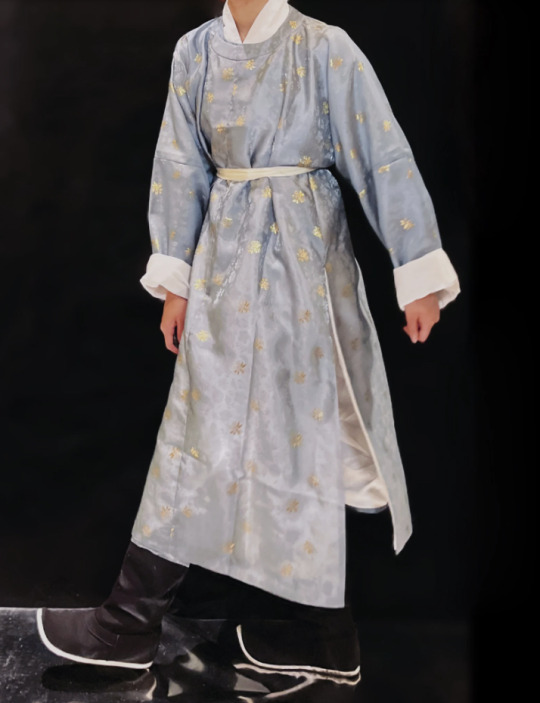
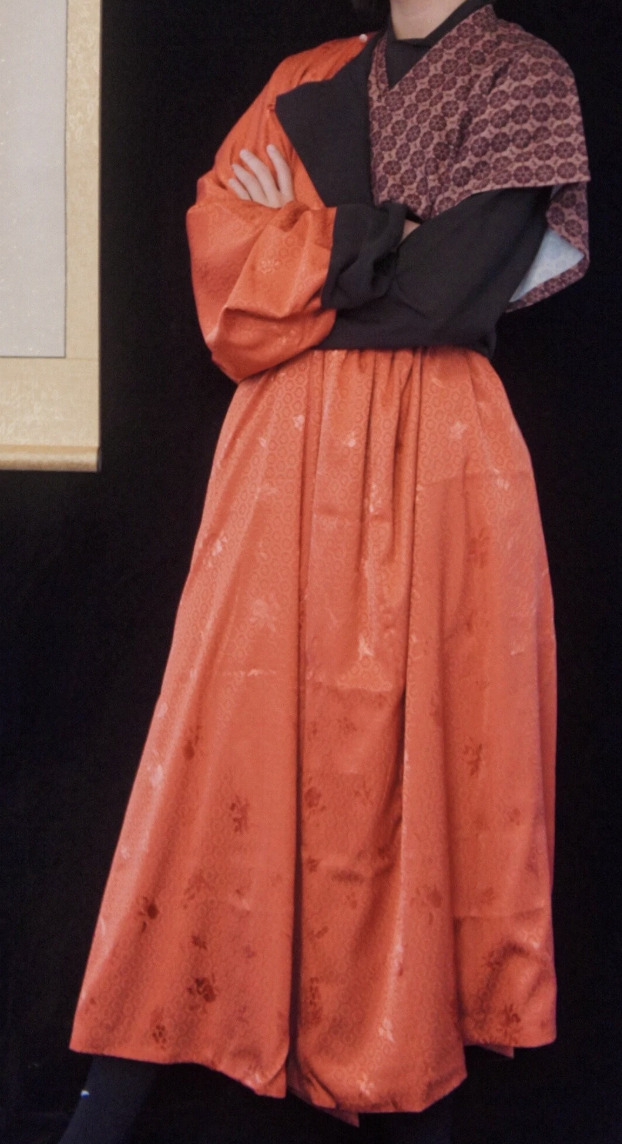
袍/袍/pao2 - Robe. Refers to a top whose length extends past the knee. Usually robes are lined, but that’s not a requirement to be considered a robe. There is overlap with 衫/襖; aka a garment can be both a 袍 and a 衫 (long unlined robe) or a 袍 and an 襖 (lined robe), but not an 襖 and a 衫 (somehow lined and unlined at the same time, disobeys the laws of physics and logic, possibly quantum entity).

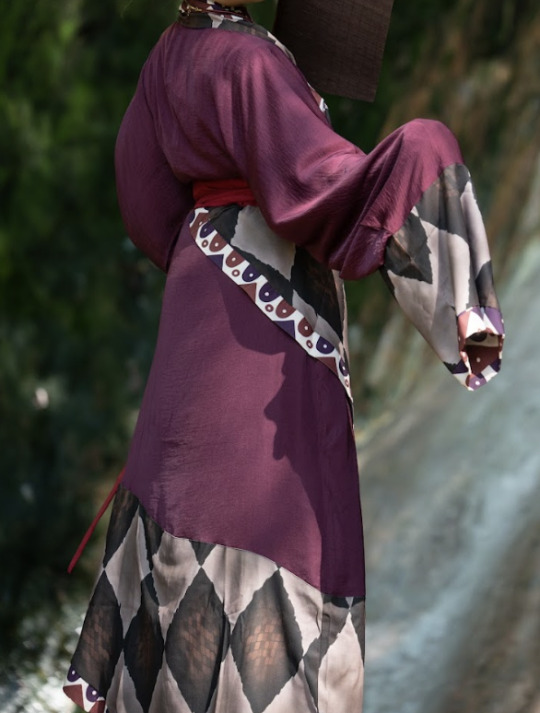
深衣/深衣/shen1 yi1 - Literally ’deep clothing,’ also can be translated as robe, but more specific in that shenyi will typically be made up of a ‘top part’ and a ‘skirt part’ that are sewn together at the waist, rather than just being a really long top.
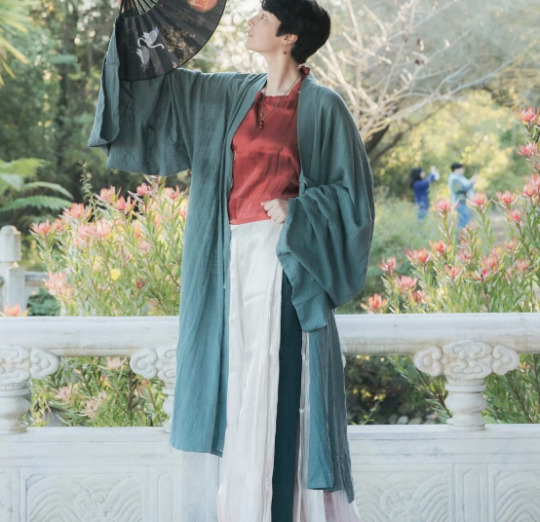
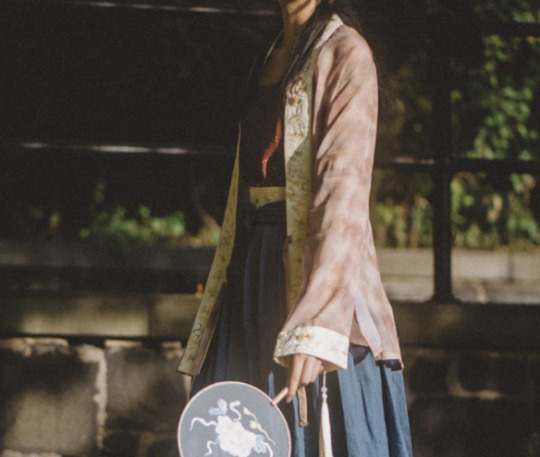
褙子/褙子/bei4 zi0 - Outer layer. Harder to define because it can refer to very different things depending on what dynasty you’re looking at. General rule though, it’s almost always an outer layer on a woman’s outfit.
BOTTOMS (the clothing kind)


裙/裙/qun2 - Skirt. Generally any garment that wraps around a person’s torso and covers the legs.


褲/裤/ku4 - Pants/trousers. Similar to skirt except there are dedicated channels for each leg, aka there’s some separation happening at the crotch. Can be open or closed crotch, almost always worn under a skirt or robe.
Obviously there's a lot of other terms too but I'll get to them with time! Still a full time student, still learning about hanfu, blah blah blah. But yeah especially the more specific terms I will probably cover in a later post. Hope this is interesting enough for now :>
navigation: hanfu in components 1 2 3.1 3.2 4 5 ...
#hanfu#hanfu fashion#hanfu photoshoot#hanyuansu#chinese hanfu#chinese history#cloud9hanfu#chinese fashion#cloud9 hanfu#九雲閣#hanfu in components
357 notes
·
View notes
Text
documenting my journey to really actually making podfic! EDIT 12-FEB: 7 days One Month
EDIT: 10-MAR!!! TWO MONTHS Of Bedtime Stories & counting!!!
+++ i am contemplating making a podfic episode narrating thru my process from start thru posting to ao3. would there be an audience for this???+++
this post is gonna be an ongoing series of links (in the replies) for blog posts that inspired me to DO THE THING! it's like tracking what bits of tumblr i was interacting with almost in real time.
-----
EDIT: 2025.03.16--want to request a podfic ??? https://forms.gle/gAGQ4zap68qZ1kj3A
-----
EDIT: 2025.03.10--i've also been making updates of podfic resources and personal stories in the replies!
and! did you know about the tumblr podfic community??? https://www.tumblr.com/communities/podfic
-----
to everyone i reblogged and/or who replied to me: i just wanted to tell you that your post was part of the inspiration & motivation that led me to making & posting my very first podfics!!! tysvm!!!
==========
follow my podfic tag xk_s_reads !!!
what's possibly coming up next for recording??? 🔮 podfic teaser
==========
my self-aimed ao3 work notes / instruction guide so i remember how i do the podfic thing (CONSTANTLY UNDER REVISION lol)
==========
BABY'S FIRST AO3 POSTED WORK !!!
[podfic] Just One More by MaelstromOfEmotions
==========
baby's first podfic experiment
https://www.tumblr.com/xiaokuer-schmetterling/772445948782821376/hope-poem
==========
tyvm for the support & encouragement in chats
@ferntasie @maelstrom-of-emotions @travelingneuritis @keriarentikai @geck-motj
==========
ao3 resources
the list prev in this section compiled into the 'references' chapter of my podficcing notes to self/instruction guide: https://archiveofourown.org/works/62233522/chapters/160984369
==========
pinyin pronunciation resources
i took a semester of mandarin chinese in community college forever ago and this is something i found that is catchy and quirky and funny and memorable. it's part 1 of a 4 video playlist. actually really helpful if you pay attention to the shape of the mouse's mouth. the grouped consonants all have the same mouth shape with sequentially further back positioning of the tip of the tongue on the roof of your mouth fyi
youtube
this is a pinyin guide by user @pumpkinpaix and it has an accompanying transcript with tone markers and embedded audio!
https://pumpkinpaix.tumblr.com/post/619038202237452288/hello-cyan-you-have-the-cutest-voice-one-thing
==========
btw this is the image in my mind anytime i say I DID THE THING or similar
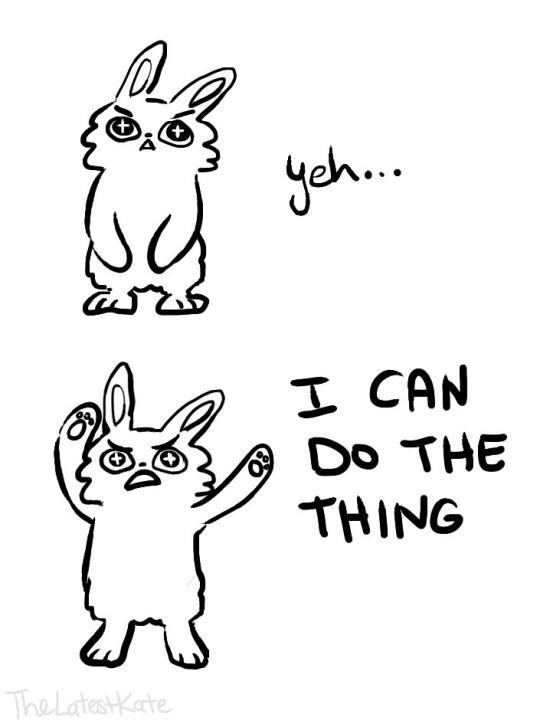

motivational art by @thelatestkate
=========
end post
#xk_s_reads#long post#my podfic journey#mdzs#ao3#ao3 resources#pinyin#🎧 process podfic#my ongoing podfic journal#📀 featurette#adventures in podficcing#podfic resource#podficcer resource#podfic
156 notes
·
View notes
Text
Let's suppose you want to learn Chinese mainly to read webnovels (or other reading material).
Now, personally, I recommend some study of pronunciation like pinyin, and watching some videos or reading some articles on tones and tone sandhi, grammar, hanzi and hanzi structure. Because at some point you'll probably want to listen too, speak too. So you know - use other resources to study the other skills! If you plan to do anything besides read eventually. Also, I think some pronunciation study actually helped me with remembering hanzi (the sound components in them) and reading skill.
But lets suppose you're studying mainly so you can read webnovels. Which is what I did in my first year. And you can set a goal to start reading webnovels within a year. For some people it takes as little as 3 months to start reading webnovels, for others like me it took around 6 months to start reading webnovels and 12 months to feel comfortable.
Download Pleco app and Readibu app. These apps will be your best friends. Pleco app is a dictionary tool so you can look up unknown chinese words, and it's Clipboard Reader area is where you can paste any chinese text into and then click-translate any words. I recommend the first time you look up any word, you press the dictate/speaker tool so you can hear how it's pronounced. You can save words in Pleco and study them using Pleco's built in SRS flashcards if you wish. Mainly though, the important part is using Pleco to look up words, read example sentences, and to use the Clipboard Reader area to read any Chinese text you find online. Pleco has an area to purchase graded readers, these will probably be some of the first things you read (if you choose to use paid resources). Readibu app is a click-translation Reader app for Chinese, you can browse the app for webnovels, or you can go to the Search area and paste in a url of a chinese webnovel, then Readibu will say it's not in the database so click 'search with Google' then you'll see the url as a result and click it, then bookmark the webnovel page in Readibu. From there you can click the open book icon on any webnovel, and it will make it just click-translate text and provide you the Readibu app features. Once you're reading a lot of webnovels, you may wish to use Readibu to read, for some people it will be more convenient than Pleco for going chapter by chapter.
Make a plan to start studying hanzi. I recommend you focus on the most common 1000-2000 chinese words, or the HSK 4 vocabulary, or both. The goal here is to get your vocabulary and hanzi recognition around HSK 4 level. I used this book (Tuttle Learning Chinese Characters: (HSK Levels 1 -3) A Revolutionary New Way to Learn and Remember the 800 Most Basic Chinese Characters) because it just clicked with me, I just read through it over a few months. You can use SRS flashcards (like Anki or Pleco) collections that people have made (I recommend this Mnemonics Simplified Hanzi Deck, or Mnemonics Traditional Hanzi Deck). For common words, I recommend Spoonfed Chinese anki deck (note it has some mistakes but I like that it has audio and sentence examples), but there's a ton of anki decks and common word frequency lists (you can genuinely just study a list) just pick a resource you like with either 2000 common words or HSK 4 vocabulary. Literally just pick any study materials where you can learn roughly 1000 common hanzi and 1000 common words or more. Whatever materials work for you. Study however you want - some people find anki flashcards useful (I just cram studied 1000 words for a few weeks each then never looked at anki again), some find books useful, some find textbooks useful, some use vocabulary lists, some use videos, just pick something. Your goal is going to be to study these words/hanzi in 3-6 months. 8-10 months if you want to wait to read longer, or need more time to study. I studied 800 hanzi in the book I linked for the first 3 months, then 1000 words the next month, then 1000 words the next month, then about 500 more hanzi the next month. It is okay to cram study! It is okay to not memorize these hanzi and words! Just get a basic familiarity! You are going to fully learn these common hanzi and words when you READ later.
As you are studying common hanzi and words, start reading a grammar guide if you would like some knowledge of grammar. Or watch some grammar videos on youtube, whatever clicks best with you. Basic Patterns of Chinese Grammar is a good grammar guide summary book, AllSetLearning Chinese Grammar Wiki is an excellent website you can read. I read another grammar guide summary, the website no longer exists. Again, do not try to memorize and drill this stuff, just go through it and get a basic familiarity. You can move on if a particular grammar point makes no sense right now. Learn about grammar the same time you're studying hanzi and common words, so the first 3-6 months.
Okay it's been 3 months! You know some hanzi (maybe 50-500), you know some words (maybe 50-1000 depending on how intensely you've been studying)! Start reading! You're going to start with Graded Readers, which are reading material made for learners. Heavenly Path's Comprehensive Reading Guide suggests some free graded reader resources in the Below 1000 characters section. I used Mandarin Companion Graded Readers and other graded readers I could purchase in Pleco. Mandarin Companion has some graded readers with 50 unique characters. I started with some Pleco graded readers that had 300 unique characters, then moved up to graded readers with 500-800 unique characters. Read graded readers! Reread them! Look up any words you don't know (using Pleco or something else). Listen to the pronunciation of any new words. If reading in Pleco, you can use the Dictation tool to hear the sentences read aloud. When using graded readers in general, use any audiobooks that accompany them. Mostly though just read, read, read, and look up anything you want. Look up grammar points in something like AllSetLearning Chinese Grammar Wiki if you are now starting to see some grammar that confuses you while reading. The reading practice is what is going to teach you the words you've been studying in other materials.
Now it's been 6 months. You've been working your way through graded readers of increasing unique character count (and are now reading graded readers of at least 800 unique characters or more). You've been working your way through studying common hanzi and words, and now have studied at least 1000 words or more. (If you cram like I did, you probably have studied over 2000 words but only the 800-1000 words in your graded reading material have been 'fully learned' and the other words you studied are only vaguely familiar, this is perfectly fine). Go to Heavenly Path and start reading the stuff they recommend for people who know 1000-2000 characters. I think @秃秃大王 by 张天翼 is perfect for people who know around 1000 characters to start with. You can keep reading some graded readers like those that go up to 1500-2000 unique characters if you'd like, but start trying to read novels for native speakers too. Again, I recommend anything in the easiest 'recommendations' from Heavenly Path's recommendation list of webnovels, a lot of novels for children will be perfect at this point. You'll gradually work on increasing the unique characters of your reading materials. Read in Pleco or Readibu so you can use the click-translate tool. To find webnovels online, paste or type the chinese name of the novel (and author if you know it), and then 'zaixian yuedu' like this '秃秃大王 张天翼 在线阅读'. It is very easy to find novels online in chinese.
From here you just continue reading more difficult novels! Go at the pace you choose! Once you're reading stuff with 2000 unique characters, then if you wish you can stop studying hanzi and common words outside of just looking them up in reading. You can of course continue to study hanzi and words outside of reading. But if you'd rather just learn words by looking them up as you read, you can start doing that as soon as you switch to novels for native speakers (1000-2000 characters). Congrats, you are reading webnovels!
Some people start reading webnovels within a few months, and you can start with a higher unique character count if you wish. Such as starting with MoDaoZuShi or Zhenhun or SaYe as soon as you go from graded readers to regular novels. The difficulty curve will be a lot steeper, and you'll be looking up a LOT of words for a while. But other people have done it. I started reading webnovels around 6 months, after doing graded readers for a while, and it took picking several easier and harder reading materials until I found a comfortable reading level to continue from.
So it boils down to: start studying very common words and hanzi (a list, a book, anki, whatever works for you, and you don't have to memorize just get some Exposure some Basic Familiarity), read about grammar if you wish (again just get some Basic Familiarity so later if you need to look up a grammar point in depth as you read, you know what to look up), and START READING ASAP. Use Pleco and Readibu to read with click-translations of words. Start with graded reader materials, then as soon as you can tolerate move on to novels for native speakers. Heavenly Path's website is a great resource for finding reading material at your level if you have no idea what to pick and don't want to trial and error different webnovels until something is doable. For anyone who finds sounds help with memory (like me) or who plan to eventually learn to listen to chinese, listen to the pronunciation of any new words when you look them up. If you watch cdramas, cdramas often have chinese subtitles on them, those can be good practice for reading as well.
You can start reading within a year. You can read graded readers within a few months, as soon as you feel it's tolerable. And then you can just learn new words BY reading, review words you've looked up before BY reading, review grammar BY reading, and work your way up to reading whatever webnovels you want. I find learning words BY reading much easier for myself, doing what I want to do in the language as I'm learning to read, much easier to stick to and enjoy than anki flashcards or word lists or textbooks. So from me, the suggestion to push yourself to read graded readers ASAP is so you can get to the part of learning BY reading quicker.
#chinese resources#rant#chinese reading#study guide#i am not sure what to tag this#chinese langblr#reading rec list#rec list
135 notes
·
View notes
Note
How do I accurately include diversity, and not make it look like I’m just putting it in there for the sake of it?
Writing Diverse Characters - Things to Remember
Honestly, there's no definitive answer to this.
Your characters are people with clear goals, desires and a role to play in the plot. As long as they aren't just sitting there with little else but their race/gender/disability, etc. as their ONLY personality trait, at least you're on the right path.
As for representing a diverse character realistically, here are some things you can consider to get started.
Do's
RESEARCH. There are plenty of blogs/YT vids/websites that exist to help you! Meet people!
Get beta readers.
It doesn't have to be explicit. Racial identities become quite clear early on through the setting, name, and initial description(hair, eye/skin color, body shape, etc) without having to drum it into the readers each time. Gender diversity can be conveyed through the use of certain pronouns without awkward declarations.
Character first, diversity second. Please don't intentionally create a diverse character and then think about how you can push them into the cast. Have a working character, who happens to belong to a particular group.
Read works that have represented a group well. There are plenty of non-fiction works, movies and documentaries that capture the lives of people around the world with a good eye.
Use the correct terms/language
Include different types of diversity
Don'ts
Race/gender/diability is NOT a personality trait. Please. Telling me that you have a Korean girl tells me next to nothing about the character herself.
Using sterotypes. Now, it's all right if your character has a few sterotypical traits, but definitely not if sterotypes are the only thing they have.
Diversity is not a "shock factor". Suddenly revealing that a character is actually gay and has been in the closet all this time as a refresher so that it draws readers' attention? Not a good idea.
One diverse character does all. This can often be seen in female characters of slightly dated works where one woman will play the role of supportive mother, sister, femme fetale and sexy Barbie at the same time. Don't write a diverse character who basically does everything a diverse character can possibly be. All that it proves is that the writer is lazy.
Things I personally hate seeing:
Weird pronunciation of languages. As a Korean person, I always get turned off by works (mostly badly written fanfics, yes, I read those...) that try to transfer Korean dialogue directly onto the page without even checking for the correct way to spell them out. A similar example would be pinyin for Mandarin. Please, this makes the character sound stupid throughout...
Character sticking out almost painfully. If your character isn't from the region but have lived in it for a long time, what reason do they have not to blend in?
Relying on variety shows/dramas as reference. Media representation of diverse characters that are meant for entertainment is not the best source for authentic research. I die every time someone lists a number of Korean rom-coms they've watched for "research". IT DOES NOT COUNT.
As a last note, remember that there's no limit to the kind of characters a writer can writer. Accept that our job as writers is to step into other people's heads, not seeing things from one (our) perspective - and it is not going to be easy.
Hope this helps :)
#writers block#writing#writers and poets#creative writing#writers on tumblr#helping writers#let's write#creative writers#poets and writers#resources for writers#writerscommunity#writeblr#short story#fiction#writing practice#writing prompt#writing inspiration#writing advice#on writing#writing tips#writing community#writer#writers of tumblr#writers community#writers life#writer things#writing problems#writing process#writing questions
355 notes
·
View notes
Note
id assumed 吸你媽 was suck your mother off... could you explain it a bit more? I wanna understand all the insults to use on my mainland friends
Relating to this post
你妈 is literally "your mom", yeah, but as a curse, the meaning is more like "fuck you". Therefore, in the context of the exchange, 吸烟 (smoking, lit. "inhale smoke") / 吸你妈, it's more like someone going "Smoke my ass", "smoke my left nut" etc, i.e, "the fuck you can!".
With a lot of Chinese, it's a bit context dependent and maybe a different translator would go about it differently, but to me, I felt the "Who do you think you are?" vibes was what should be highlighted when I went to translate the douyin. Plus, since the joke related to transliteration/pinyin, so it felt somewhat important to make sure the translation included the 吸 part for non Chinese speakers to see how it related. Hence "smoke your mom" as the literal translation.
I would also note, 吸 (to inhale, to suck) isn't actually widely used in the oral sex context (IMO, 吃x/吹x is more common, i.e, eat/blow). Its first meaning is really just "to inhale", so 吸你妈 doesn't have a super sexual connotation to begin with, no point creating one in the translation.
123 notes
·
View notes
Text
Last of her kind Emperor!Alpha!Zhongli + Omega!Dragoness!Reader
cw/tags: This chapter has no smut but still contains highly suggestive themes and sexual implications. Mentions of slavery and past sexual abuse on fem!reader, A/B/O dynamics and heat mentions. fem!reader suffers with self-worth and bad memories, including past insults and abuse.
notes: After so long finally part 2!! EEEEEEEE I am so excited but also so nervous pls ;w; like if you want the first part can be read as a standalone and have a "happy ending" but now I am committed to the emotional roller coaster, A/B/O dynamics and LONG BURN PINING so yep >:3c hope this does justice to everyone's expectation tho. And hope you like it and accompany me on this tale hehe
As a lil sidenote brackets [] now indicate past actions/words and bad memories, regular italics for emphasis, inner thoughts or the little pinyin I sprinkled here (which btw is taken straight from genshin wiki so...).
<- Part 1 Part 3 ->

Being precious all of the sudden was… different.
Your hand subconsciously kept touching your bonding mark, as if to make sure it was still there, to soothe you.
After a quick meal just between Zhongli and you, consisting of some soft rice buns and delicious minced meat packaged inside a crispy pastry shell, you were then offered some new clothes. It was much more elaborate and certainly more layered than anything you’d worn before: a long skirt and flowy sleeves in a silky soft fabric, beautifully embroidered and hastily modified to make a hole for your tail to slip out. A sash keeping everything in place while accentuating your figure. You immediately loved it although it felt a little heavy and restricting.
Now, you quietly follow Zhongli as he leads you around the palace. He’s back to his former fully-human appearance, wearing an elegant attire, and everywhere you go, people bow at him and cast curious silent glances at you. It was rather unnerving.
It’s fine, you are used to being stared at, judged. You hold your tail up close for comfort.
The place is huge and you quickly get lost trying to map it out in your head, simply following along until you reach a large room with a few simple beds scattered around. Bookcases and cabinets stacked the walls, filled with all sorts of books, papers, jars and things. A pungent smell present in the air.
A green-haired man leans over a desk, glasses perched on his nose as he frantically scribbles some notes. What seems like powders and plants litter the space around him, along with a few more glass containers, incense, and a tea set with a steaming fresh cup.
“Baizhu.” Zhongli’s voice calls and you stiffen a little, hearing it again after a while of silence. It is still warm and deep but with a more reserved and regal tone like when he first met you.
The green-haired man (a Beta, you recognize) looks up and blinks in surprise, then smiles brightly and says some words you do not understand, you shuffle in place.
“Yes, this is her.” Zhongli replies. “I will ask you to speak in in common tongue so she can understand as well, I don’t want to unnecessarily unnerve her.”
Well, that is… very considerate. It eases you a little.
“Of course, your majesty.” He turns to you, his eyes were a bright amber, also with slitted pupils. Was it common in liyuens? “My name is Baizhu, the royal doctor and apothecary, pleased to meet you, empress.”
Empress?!
“E-Empress?!” You can’t help but blurt out.
“Why of courssse.” A high-pitched voice hisses and you almost jump when a white snake peaks her head from her coils at the desk, staring up at you. “You’re mated to hisss majesssty the emperor, sssso, it would be underssstood you’re now the empresssss.” Her split tongue flickers.
Baizhu chuckles. “Changsheng, be nice.”
You don’t know what to answer, mostly because you’re still reeling from the fact that you’re apparently now an empress, and because there’s a talking snake.
Liyue is weird…
“I decided to bring her here exactly because of that.” Zhongli turns to you and suddenly holds one of your hands, softly, staring at you with such affection it makes you melt. “Darling, would you let him check your bonding mark for a moment?”
You’re a little nervous, but it is not like you can refuse… right? You nod quietly.
Baizhu approaches and examines your neck and you fight the urge not to flinch or growl. No Omega likes it when a stranger is so close to such a sensitive spot. He hums and tilts his head but doesn’t touch you. “It seems it’s already healed due to her illuminated beast blood but the scar is present. I’d say the bond has been properly established, congratulations your majesty.” He smiles warmly.
A grateful bubbly feeling creeps up your chest. Properly established. So, it’s true.
You feel Zhongli’s hand squeeze yours lightly and look down at it, then back up at him. “Thank you, Baizhu. I will not keep you any longer. We still have a lot to do and I’m sure you do as well.”
Baizhu bows at him (at both of you, you realize) and then you’re on your way. Not before hearing the snake’s hissy whispers again
“A fine yin, hm…?”
--------------------------------------------
This is… your new home.
Zhongli shows you around some of the areas in what he called the “inner court” of the palace complex. Everything is so… large and open and lavish it has your head spinning, your eyes darting in every direction trying to take in all at once, walking fast on your new clothes. He guides you along the dining hall, a small temple, crosses through an enormous main hall where he explains audiences are held, and then a gorgeous outer garden that completely takes your breath away.
The wooden gilded architecture in golds and reds, the fresh wind and gentle sun. All sorts of new sounds and smells. The painted walls and high ceilings. The new plants and flowers. The chatters in a different language… everything is so distinct from the desert.
You soak in the new environment. Inhaling deeply.
It is both terrifying and exhilarating.
Finally, he guides you to another room, it looks similar to the nest room where you’d first been at, but larger. It is sparsely decorated with a large and comfy looking-bed, a desk, mirror and a small table with a couple chairs and a tea set. It smells nice enough.
You peek up at Zhongli.
“This will be your room.” He explains.
…What?
“We kept it simple for now but you are, of course, free to furnish and decorate it however you’d like. It’s close to my own room and anything you might need.”
Wait what?
Your ears lower down and you seem to deflate a little, disappointed. “H-Huh? But… I-I won’t be sleeping with you?” You ask softly.
Mated pairs sleep together, don’t they? They share living chambers and mix their scents together to symbolize their union. That’s what you’ve always been told. You are to always be near your Alpha, at his beck and call, warm up his bed and be ready to please.
Maybe things are different in Liyue? Or maybe it’s because he’s an emperor. Master didn’t tell you anything, so maybe you are just making a fool of yourself right now on your-
Zhongli clears his throat and looks at you a little surprised “I simply thought you’d be more comfortable having your own space, we… don’t really know each other very well yet, and I wouldn’t want to impose.”
Impose? As in order? But he’s your Alpha! “B-But I want to! Please! I-I mean… I thought that since we’re b-bonded…” You mumble shyly.
His cheeks turn a little pink, you like when that happens, he looks a lot less serious. He cups your cheek and you inhale looking up at those gorgeous golden eyes. “My dear dragoness. I don’t want you to feel forced to do anything you don’t want to. I know you were raised… differently, I cannot claim to understand your experiences, but listen to me: you are safe here.” He says the last part slowly, enunciating each word. “No one will scold you or punish you, least of all me. I want you to be free to speak and choose what you want.” He sighs. “Though I know it’ll be difficult...”
Furnish, impose, free… you don’t know any of those words.
But no punishment, to choose what you want, to be safe… it sounds surreal even.
What do you want?
His eyes soften at your nervous silence. “Let’s try this… do you really want to share my room, or would you like to stay here? I won’t be upset if you do.”
“I…” Your tail curls around you. “I want to stay with you. Sleep together. Like mates.” You mumble.
“Then it would be my honor, however, this room will stay ready if you change your mind, alright?” You glance around at the room again, and nod. “Now that that is settled, I have one last thing to do. I need to introduce you to a few very special people before I leave to-”
“Leave?!”
You didn’t mean to yelp like that.
“J-just to do my duties, I am not leaving you, I promise.” He corrects, a little taken aback. “I am sorry my dear, but as much as I’d like to spend every moment by your side right now, I have a few pressing matters to tend to. I know you’re nervous, everything is new and scary and overwhelming but I promise I’ll leave you in good hands and be back as soon as I can.”
You nod, now feeling a little embarrassed at the whole ordeal. You’d been feeling so at ease with his presence, showing you around, listening to his voice name and explain everything you saw that you’d almost forgotten. “You’re the emperor, I’m sure you’re very busy. No need to worry about me, I’ll behave, my lord.”
He frowns a little at that but says nothing, and you choose to say nothing else either.
Going back to the main hall, you immediately spot three people lined up looking at you with a mix of the already expected curiosity and excitement. One of them in particular immediately catches your attention, he’s an Alpha and you can’t help but feel a little nervous…
“Allow me to introduce you, these three are my most loyal and closest council members: Ping, Ganyu and Xiao.” Zhongli gestures at them and all three bow lightly. “Like you and I they all have the blood of xiānshòu, and you can ask them for anything should you need help or have questions. I hope you learn to trust them and feel at ease.”
You nod quietly, still a bit fixated on the other Alpha.
“Xiao, or general Alatus, is one of Liyue’s strongest, most resilient and skilled warriors. He usually keeps guard at the palace to ensure my wellbeing and now yours as well, if you ever feel danger call out his name and he’ll come.”
Ah, did they notice you were staring…?
With a gesture of his hand Xiao manifests a gorgeous Jade spear, crystalline green shards reflecting light as he taps it by his side, standing firm, you flinch in surprise. “My spear shall now serve you too, empress.” His eyes too are golden and sharp, filled with a certain rigidness and determination you can’t quite put your finger on.
“Thank you, Xiao, dismissed.”
Xiao hums quietly and promptly disappears in a burst of black and green smoke, you stand there a little startled, your hand clings to the brown fabric of Zhongli’s sleeve.
“He might be an Alpha as well, but I promise you he’ll cause you no harm.” Your alpha murmurs softly towards you.
“O-okay…” You squeak, a bit embarrassed.
“Ganyu here is one of the most reliable people in the palace, perhaps the entirety of Liyue. Everything of importance reaches her ears and passes through her eyes. She’s able to organize meetings, events, report, compile information and assist every negotiation and decision of this palace with stunning efficiency. She too will help you with anything you need and might be in charge of a little logistics regarding you settling in for the next few days.” Zhongli smiles.
The young woman with long blue hair and… horns? chuckles and blushes a little. “Your majesty, you're too kind, I merely love doing my job.” She puts her hands together and beams at you, sunset eyes bright. “I’m so honored to meet you, rest assured I’ll take care of anything you need. I hope you feel comfortable and welcome at the palace!”
That sounded like a lot. You weren’t used to people coddling you like this. You didn’t want to give anyone trouble or work. “T-that’s alright, thank you.”
“Now, Ping is probably going to spend the most time with you, she’s very knowledgeable in culture, history and the inner workings of the palace amongst other things. She has graciously offered to teach you liyuen and anything else you’d be interested in.”
Unlike the other two Ping has a certain calm aura to her, contrasting Xiao’s seriousness and Ganyu’s excited energy. You can tell she’s a gentle old soul as she approaches you with a soft wrinkled smile and graying hair.
“Don’t worry young empress, while Lord Morax here is regrettably busy with a work-packed schedule,” She gives him a playful side stare “You and I will have some fun. I’m sure we’ll get along just fine.” She takes your hand and pats it comfortingly. It’s kind of an awkward gesture for you, but you still welcome the warmth and good intentions.
Zhongli chuckles quietly. “In that case, I’ll leave you in her care and see you at night for dinner, alright?” He seems to hesitate for a moment but then cups your face in his hands and places a soft kiss at your forehead. The unexpected gesture has you blushing scarlet and your heart speeding up like crazy. His thumb brushes at the scales under your eyes, so affectionate in the smallest ways… “I know it’s not ideal, but it’ll be fine, yes?”
You stare at his golden eyes, the red lines, his handsome face framed with dark hair, his serene smile.
You don’t like this. You don’t want him to leave. The idea makes you uncomfortable.
But it’s not like you can say no.
You nod.
“Thank you, Ping.” Both of them exchange a glance and then he turns to the blue-haired woman still in the room. “Ganyu, if you will.”
“Right away your majesty!” She scurries after him, talking quickly in foreign tongue while both walk away.
You stare after him for a moment longer.
“It’s a little difficult, isn’t it?”
You quickly turn back to Ping and then look down, ears folding back.
She laughs softly. “No need to be ashamed dear, it is understandable that you are unsure with all this, it’s a lot of changes for such a short time and you bond is still fresh, but let’s take it easy.”
Your hand brushes at Zhongli’s bonding mark again. “O-Okay…”
“Are you hungry? Tired? Perhaps you want to rest a little?”
You want to scurry away to your mate’s room and curl up there, that’s what you want, but…
“Um, aren’t you… going to train me?”
Ping blinks a little taken aback “Train? Oh! Teach?”
Same thing.
“Well, yes. I did offer, but only if you’re feeling up to it young empress. You can take your time, we don’t have to start right away. And like I said, take it easy, it's only your second day here.” She explains. “You won’t be absorbing any information if you are uncomfortable and jittery like this.”
“S-sorry-”
“No need to apologize at all. Now tell me, is there anything you’ve seen or heard today that you’re curious about, anything you want to do?”
What you want…
You think back a few hours earlier. The infirmary, the small temple, the grand hall, and…
“The garden.” You speak. “Can we go outside and see?”
Ping smiles brightly. “Of course! I’m sure there are a lot of things there that will catch your interest and cheer you up.”
Your tail sways a little after you as you follow the old lady along the corridors.
------------------------
The garden is breathtaking.
More than a garden it feels like a whole different world. Bright and exciting and colorful, full of life. It reminds you of an Oasis, but just… more!
A grand pond with multicolored fishes and a couple of turtles sunbathing. Walk paths made of stone, plants everywhere you see: in trees with vibrant yellows, oranges and all shades of greens, in flowers with soft colors and small petals, in thick bushes. The light filters through the leaves and there’s the soft tweets of small birds.
“It’s… so pretty!” You exclaim happily.
“I’m glad you think so. Gardens like this are carefully cared for and preserved to impress, but they also represent beauty, abundance a sense of harmony.” Ping explains as she is now the one following after you, skipping along the path. “These trees you see are sandbearers, and that one is a ginkgo tree, you can tell the difference by the shapes of their leaves.” She points at each one and you follow with your gaze, picking a small leaf from the floor, golden and fan-shaped.
“Ooh…”
“See those smaller fishes? They’re goldfishes. The bigger ones are kois.” She gestures at the animals freely swimming around. Some of them are huge!
“What do they eat?” You blurt out.
“Well, usually algae and wheat. We can get some another day and you can feed them.”
“Really?!”
“Of course.”
“Oh! Is that a koi too? It’s so… long and pretty.”
“Ah, that one is a golden koi. Lord Morax has a few of them here. They are also called Jīnchì Jiǎlóng or ‘false dragons’ you know? For the small horns and long bodies. They do resemble your tail a little, don’t they?”
You move your tail forward and stare at it, then stare at the serpentine fish.
“Yes, sort of… Jin chi… jia long.” You mumble.
“Here, I think you’ll like these ones. Come with me.” You eagerly follow after Ping as she rounds the pond and guides you towards a few red bushes. They’re dotted with pink round flowers. “These are silk flowers, Nícháng-huā, usually harvested to make clothes, but there are many special ornamental variants and between us both, your dear mate has a weak spot for these so he has quite the collection.” She chuckles.
“Orna…metal?”
“Ornamental, it means mostly for decoration.”
“Oh!” Suddenly you feel dumb, you’d thought for a second that was a liyuen word too. “I’m sorry… I don’t even know common tongue very well.” How could you even expect to learn liyuen?
“No worries, dear, learning a new language is a daunting task, it takes a bit of work every day. If you keep learning, using and practicing words, you’ll get there.”
You smiled softly. Ping was so… patient and supportive.
So much different from…
[You have to try harder.]
[Tch that is not good enough.]
[Are you stupid?!]
[Useless omega.]
You looked at the budding silk flowers and blinked. Once. Twice. Why was your vision blurry now? What was this feeling?
“Oh, oh young empress please don’t cry. It’s alright” Ping’s alarmed remark helps you understand. She fusses over you. “Are you ok?”
You wipe at your tears and smile, a genuine bright smile.
“I’m fine.”
And this time, you truly mean it.
----------------------------------------
After a rather fancy bath (the kind of like you used to take before being presented to Alphas, with bubbles and scented oils...) and a good dinner Zhongli and you headed over for his chambers for the night. You couldn’t help but be a little… nervous.
This is stupid. He’s your Alpha.
He’s been nothing but kind to you.
What if he wants to… d-do things?
Then you’ll do it. He’s your mate. It’s your obligation.
You were the one who chose this anyway.
Your heartbeat was loud in your ears, anxiety creeping up your chest. Were your fingers trembling? Was the room suddenly cold?
As expected, the bedroom was quite matching his style. Golds, browns and a bit of red and black here and there. Dragon imagery adorning some of the walls, a tea cabinet with a small table and shelves filled with all sorts of trinkets from precious stones and books to a beautiful fan and a tea set.
And then there was the bed.
A large canopy bed, enough to probably have your body and tail fully stretched across and still fit in the mattress, beautifully decorated and filled with fabrics and pillows.
The scent of Zhongli’s Alpha pheromones was definitely strong.
He yawns and runs a hand along his forehead, combing along his hair before pulling out the clip on it, letting his long dark locks spill free. He takes off his robe revealing his naked torso and you jolt.
It’s fine. It’s fine. It’s fine.
You undress as well into your light sleeping clothes and gingerly slip into his bed, curling up around his pillows, surrounded by his scent.
His.
You are his.
It’s fine, it’s fine, it’s fine-
“Darling, is everything alright? Are you uncomfortable?” He asks concerned, climbing on the bed as well and reaching out to touch your arm. You squeak. “You’re… terrified, what’s wrong?” Then Zhongli’s eyes widen a little. “Oh. The scent… I completely overlooked that, my apologies. Is it too strong? Are you ok? Should have given you some things earlier for you to scent and include them here. This is no good…” He rambles a bit to himself as he sits up and crosses his arms thoughtfully.
You stare at him, anxiety still surging through your veins but now mixed in with confusion.
“Would you like to sleep in the other room we prepared for you instead?” He sighs.
“I… t-this is… you… would just let me leave?”
Zhongli tilts his head slightly, now he looks confused.
“I promised you that the room would be available-”
“So, you don’t want to mate?”
Silence.
He stares at you for a moment as you grip at the bedsheets, still tense.
His eyes widen as realization settles in.
Ah. The pink dusting in his cheeks is back.
“Y-You thought that… no! My dear, no, no, no…” He coughs into his fist awkwardly. “I apologize if I gave you the wrong idea. A-As I said before I want you to be comfortable and feel safe. No Alpha will force you to do anything you don’t want. Not even me. And you don’t have to feel forced to do things you don’t want to, either.”
You look down. Although you feel slightly more relieved.
“I want to stay here. A-and if you want to, I’ll service you, my lord. I was just… nervous, sorry.”
“I assure you there is no need for any of that.” He says softly. “Here.”
He pulls the covers and slips them over you both, lying down facing you but still keeping a little distance. You do the same, curled up face to face with him.
He’s so effortlessly handsome.
And kind.
And you like him.
But he’s still an Alpha.
“Is this alright? We’re just going to sleep, I promise.” He brushes some hair away from your face.
You nod.
“Is there… anything you want to talk about or ask me?”
You... don’t know.
You shake your head.
“Hmmm. Want to share about your day? What were you up to with Ping?” He gives you a playful smile. Suddenly he feels less like an imposing strict emperor, or like a scary Alpha. He’s just your Zhongli.
“She… showed me the garden. I wanted to see.”
“Ah, the royal garden has many fascinating sights and it’s a beautiful landscape to retreat to and ease one’s mind. I had the feeling you’d be interested.”
“There were so many beautiful things. She taught me about the silk flowers, nícháng-huā. And all the trees and fishes and birds.”
“Oh? Are these your first words in liyuen, my dear?”
You giggle. “I… suppose they are. She also showed me your turtles Jiàn and Fù and told me what their names mean, they are so cute. Oh! And we saw the liúlí bah… bai… bǎihé! I sang to them and they bloomed! It was... amazing.”
“I see. Not everyone can achieve that, I’ll admit I’m quite hopeless at singing.” He chuckles “What more did you learn?”
Feeling much more content and at ease you continue retelling all the new things you had experienced and the vocabulary you had learned including how to introduce yourself and some greetings and basic words. Talking for what felt like hours until weariness and sleep claimed you both.
Zhongli simply listened and stared at you, captivated. He seemed content as well.
It made you happy.
------------------------------------------
For the next couple of months, you established a sort of routine.
You’d wake up early alongside Zhongli, even though you didn’t need to, you simply enjoyed having some morning tea and breakfast with him. Afterwards he’d go tend to some of his official duties and you’d stay with Ping Lǎolao, learning more and more each day. By now you could even follow some basic conversation (provided the other person didn’t speak too fast) although reading and writing was still extremely difficult.
You’d expressed interest in some gardening and even headed to the kitchens to prepare some food by yourself. The maids claimed there was no need for the empress to do such ‘menial tasks’ but as an Omega you pride yourself in certain things, and cooking for your Alpha was something you’d yearned to do.
You were overjoyed when Zhongli praised your Jade parcels.
You’d always have lunch with him and some days he’d accompany you for a stroll or you’d stay at his study for some leisure time, or even at some meetings. It had been a little unnerving at first but you also knew it was important to know others and be known in the council, as well as understand Liyue outside of the palace walls. After all, you are an empress now.
At night, you slept close to him. The initial awkwardness of sleeping at opposite sides of the bed soon traded for a much cuddlier approach, often with you curled up to Zhongli’s chest or him spooning you, tails often intertwined together. The bed and the entire room now have a mix of your combined scents, like true mates.
And so, life was good…
------------------------------------------
You’re slowly pulled out of your sleep as Zhongli stirs in the bed. You grumble a little and yawn, already missing his warmth. It was so pleasant…
“Good morning, my dear dragoness.”
“Morning…” You mumble, not opening your eyes and instead blindly reaching for his pillow to hug and cling to. “Can we stay for longer?” You whine.
“You definitely can, but I have to go.” He kisses your forehead “Rest, my dear.”
You pout but say nothing. Squeezing at the pillow and burying your face in it.
It smells so good…
------------------------------------------
“Hmm… is it warmer today?” You wonder aloud as the maids help you up with the layers of your hanfu. The clothes still hot and heavy in contrast to what you used to wear at the desert, but today seemingly more so… the sash feels more constricting than usual. “I-I think I’d like to wear something a little lighter… if possible.”
“Of course, your majesty, no problem.”
You smile at them, grateful.
--------------------------------------------
Sitting at Zhongli’s study room you practice some basic liyuen calligraphy while he seemingly goes over some important documents. The silence is comfortable and a warm cup of Qixing tea steams at both desks. Yet, something keeps bothering you.
You huff lightly, scratching and picking at the scales of your tail, irritated with the uncomfortable feeling. Why is it so itchy? A couple of them fall off, revealing new glossy ones underneath.
“Ah…” So that means…
You stop for a moment. The feverish feeling, scents being stronger on your nose, the urge to nest and cling to your mate.
Hmm… part of you is a little excited. And yet, there is fear.
------------------------------------------
“You have quite the appetite today, dear. Eat slowly, the food won’t go anywhere.” Ping chuckles as you practically pick a little of every dish while still trying to keep some modicum of elegance. Chopsticks weren’t that easy after all.
“Yes… I think… I think it’s my pre-heat hormones.” You sigh before munching on a shrimp ball.
Your heat…
Your first heat with Zhongli. With any Alpha to be honest. You’d always had to endure them on your own (Master couldn’t have you get pregnant) and they were excruciating and debilitating, crying out for days with your skin burning and itching, trying to sate yourself with your fingers and humping pillows. But now… you’re happily bonded.
Would it… feel good again?
Like, that first time you two mated…
You feel your cheeks heat up.
“Excuse me?”
“Hm?”
You’re brought back to reality to see Ping staring at you seemingly a little alarmed.
“Pre-heat? Young empress, are you going into heat soon?”
“Y-yeah? Probably um, tonight…? Or tomorrow.” The onsets are always so quick, and your cycle has always been more or less stable.
The elder places her chopsticks down. “Have you told Lord Morax?”
“Um. N-No, not yet. But… m-maybe he already caught on...” You tilt your head.
…Right?
Then again even you took a couple of days to identify the signs, and now for sure you were at the brink of it. Maybe he’ll mate you tonight…
Hm… how will Zhongli react to your heat scent?
You have to do your best!
[Be a good omega.]
Ping stands up, her expression still gentle but with a sort of urgency to it, your instincts catch the feeling she’s worried about something.
“I have to inform about this, please stay here dear.”
Now you’re nervous. You nod slowly.
Why does it feel like you did something wrong…?
------------------------------------------
After that, things get… chaotic.
It’s only a while later that you find yourself at the infirmary. Ganyu and Zhongli are also there and everyone’s anxious pheromones in the air do not sit well with you (subtle as they are, your nose is hyperaware right now).
“I’m sorry the symptoms are already settled in. At this point it is simply not feasible to give her suppressants, she has to go through this heat.” Baizhu says, looking troubled.
Feasible? Suppressants? More unknown words but…
Is there something wrong with your heat?
Ganyu scurries off and Ping starts talking with Baizhu on the other side of the room. You cling to Zhongli’s robe, trying to soothe yourself with his presence but his scent is… agitated.
You whine to call out to him. You’re scared.
“Did I do something wrong?”
Zhongli pulls you close, cupping your face again, staring straight at you. “No… no my dear dragoness, of course you didn’t, it’s just…” He steels himself searching for the right words, it doesn’t ease you in the slightest. “We didn’t expect your heat so soon. I should have known, noticed… I’m sorry.”
Why is your alpha apologizing to you? That is ridiculous.
“Is it a bad thing?”
“It’s… not the right time.”
You’re so confused.
Don’t Alphas like it when Omegas are in heat? Soft, pliant, warm, needy and ready to breed.
“I just don’t want you to feel obligated to do this…” He says. “And… you could trigger my rut, you could end up pregnant. I don’t want to… scare you, or hurt you. It’s much too soon for us to share your heat. I thought we’d have more time for you to get acclimated to Liyue or…” He shakes his head. “Nevermind. For the next few days you’ll be in a separate room, yes? No one will disturb you during your heat, I promise.”
“B-But then… I… what…?”
Alone?
“Usually omegas take suppressants, like a type of medicine, to stave off their heats so they don’t have to face these risks or suffer them alone, and then when they’re ready, when they want, they choose to share heats with their partners.” He explains.
“But I want to! I… I’ll be good!”
Zhongli sighs. “Darling you are good, you are precious to me. You don’t need to prove anything or do things because they are ‘expected’ of you.”
He’s not listening!
He asks you what you want. He says you can choose. But now that you tell him, ask him, beg him even… he denies you?
How come you’re always making the wrong choice?
Was it all a lie then?
“But I- T-then- Why-… YOU’RE CONFUSING ME!!” You yell, tears stinging in your eyes.
There are a few gasps and you see not only Baizhu and Ping, but Ganyu and some of the maids staring at you in shock. You cover your mouth, eyes wide at the sudden burst of fierceness and emotion.
You yelled at him.
You talked back.
You should be punished.
He stares at you, frozen like a statue for a few moments. You stare at him, pitiful, your eyes begging. A whimper leaves you and Zhongli lets out a shuddering breath.
Oh, your Alpha wants you, you know it.
"Please..." You mumble, voice so small.
"I'm sorry my dear, it's better this way." His hand moves towards you, to cup your face again or brush at your hair you're not sure, but he stops himself before you can find out. He sighs, averting his gaze and looking conflicted, and then turns around.
This is your punishment.
"It'll be just a few days, you'll be well-cared for. This is for the best." He says sternly, voice pinched.
And then he leaves.
Your heart shatters.
Everything is a blur after that. You’re gently guided along towards an empty nest room, the same one you'd first met him at, there are some things with both your scents on it but they feel sterile, washed anew.
Your hands start trembling. Your eyes start to water. Your lips quiver. Your throat feels tight, choked and dry. Your body feels feverish, hot and restless.
Zhongli rejected you.
“Your majesty please calm down."
[Useless.]
[Moron.]
[Whore.]
You could no longer breathe, hear nor see. You feel like you're drowning, unable to process what just happened. Your mate…your precious mate…he…he…
He abandoned you.
“Your majesty…?"
You scream.
#genshin x you#genshin impact x you#genshin x reader#genshin impact x reader#zhongli x reader#zhongli x you#genshin imagines#genshin impact imagines#crys writes#fem reader#LohK#just in case (?)#minors dni#c l i f f h a n g e r :)))))#I am in my evil era (?)#zgvcgjahbcajsncaj gods the emotions and issues here are so complex pls talk to me about the fic I will happily rant a lot#I love dragoness reader so much is2g#I want her to be happy#bit it'll be a journey until there#shoutout to honorary sisterwive guizhong speedwagon and her tiny husband for their cameos (????)#golden kois are my fav genshin fish can you tell?#also I decided on silk flowers and later remembering of all the variaties zl talks about during the archon quest and lmao#anyway ty all ILU byeeee
1K notes
·
View notes
Text
[Hanfu · 漢服]Chinese Late Warring States period(475–221 BC) Traditional Clothing Hanfu Based On Based On Chu (state)Historical Artifacts
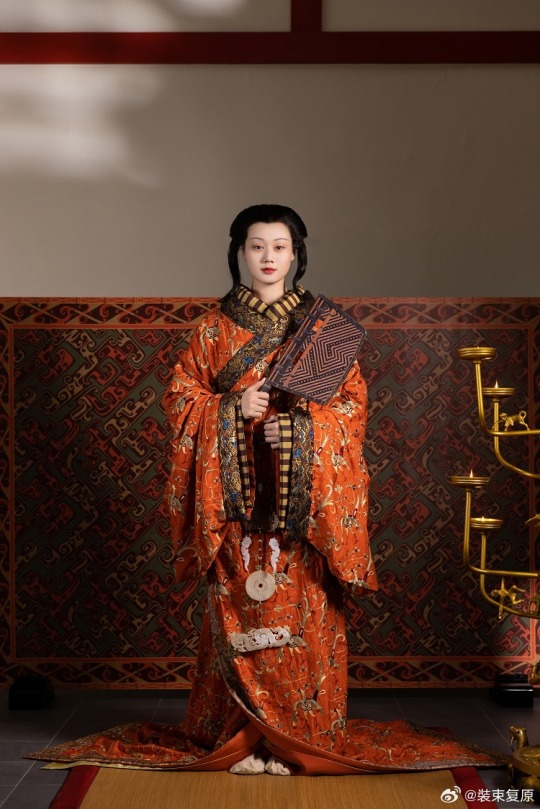
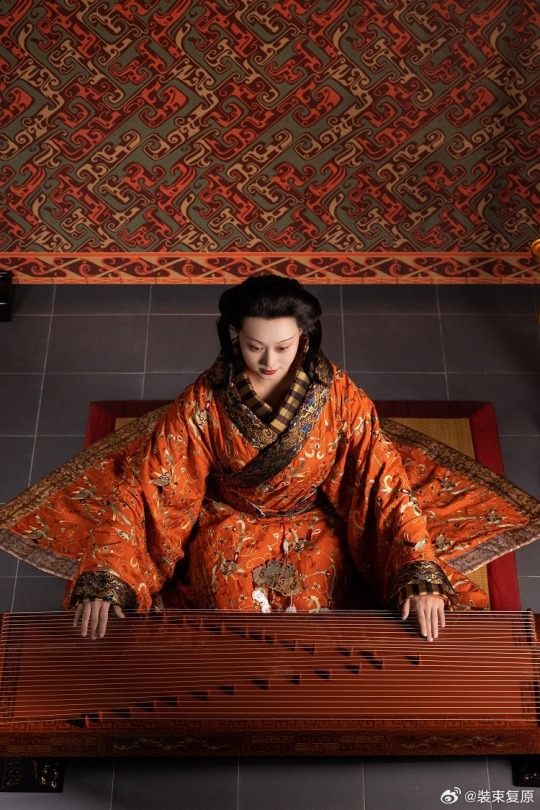
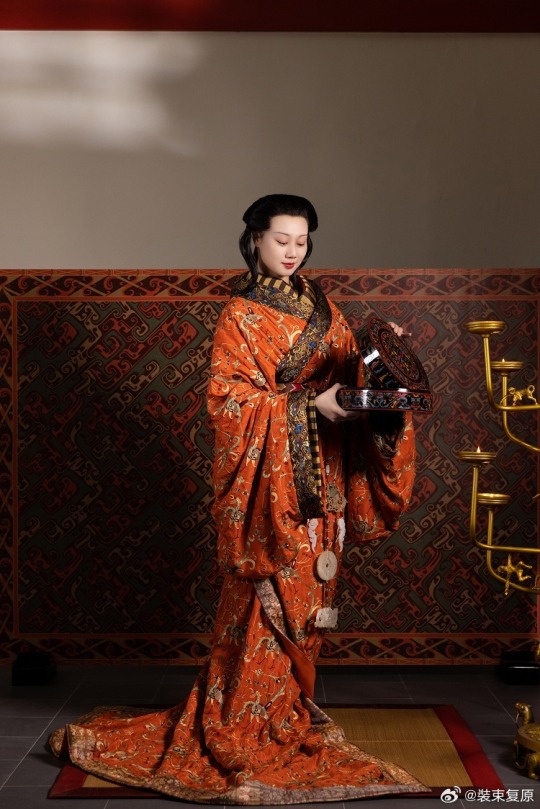
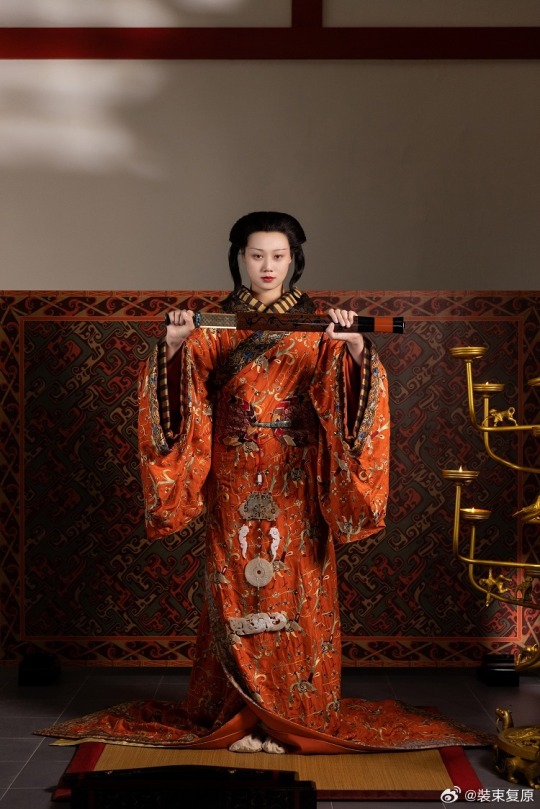
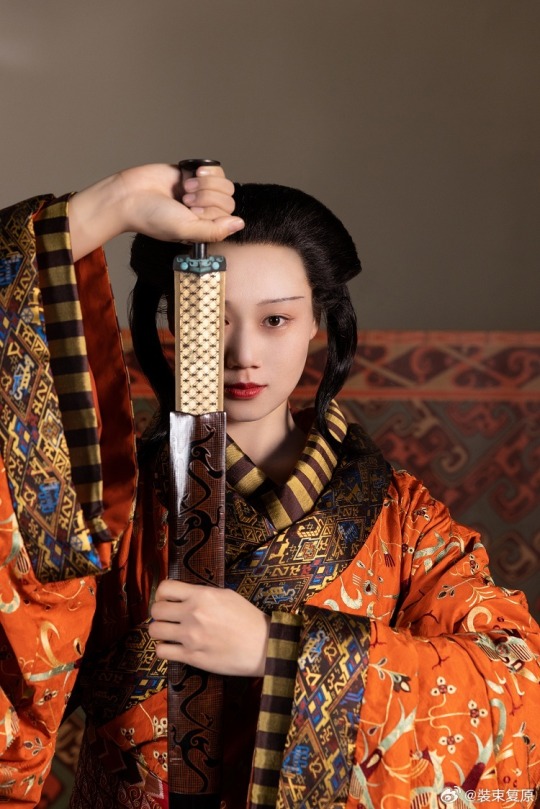
【Historical Artifact Reference】:
Late Warring States period(475–221 BC):Two conjoined jade dancers unearthed from Jincun, Luoyang,collected by Freer Museum of Art
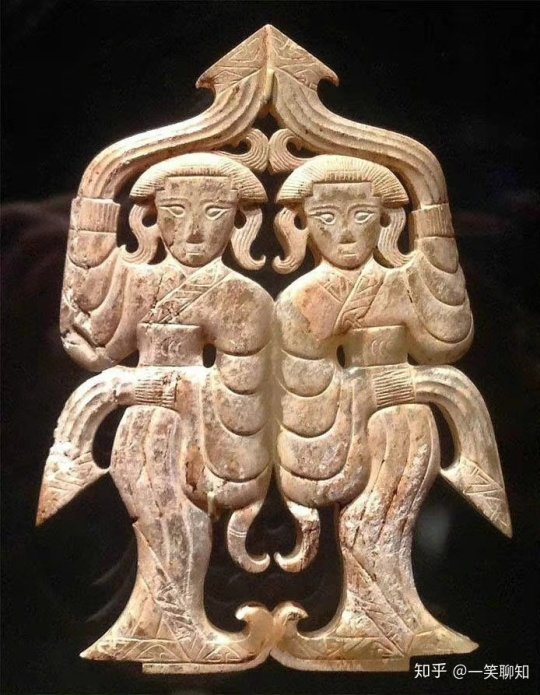
A similar jade dancer was also unearthed from the tomb of Haihunhou, the richest royal family member in the Han Dynasty, and was one of his treasures.
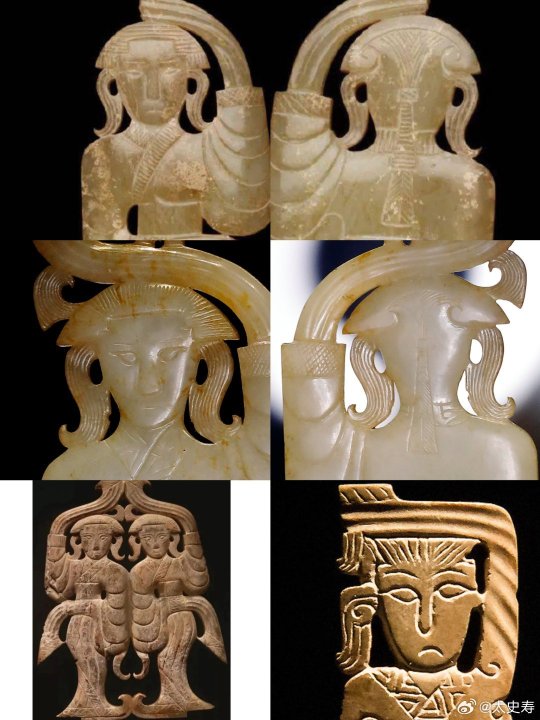
Warring States period, Eastern Zhou dynasty, 475-221 BCE,jade dancer by Freer Gallery of Art Collection.
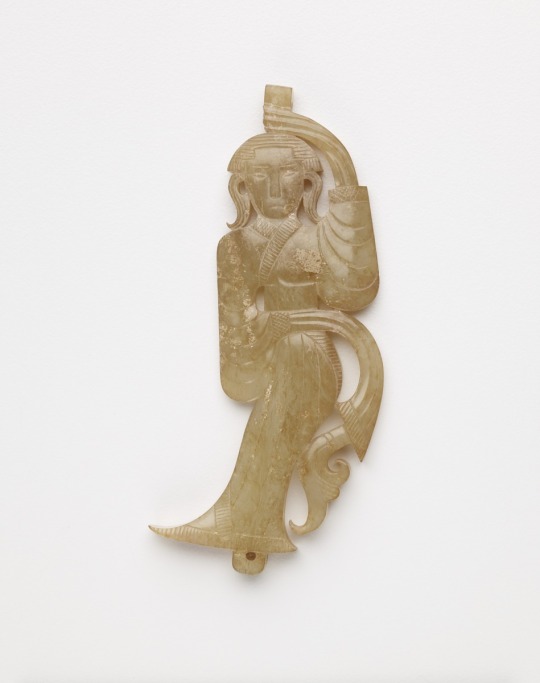
Warring States period(475–221 BC)·Silver Head Figurine Bronze Lamp.Unearthed from the Wangcuo Tomb in Zhongshan state during the Warring States Period and collected by the Hebei Provincial Institute of Cultural Relics and Archaeology
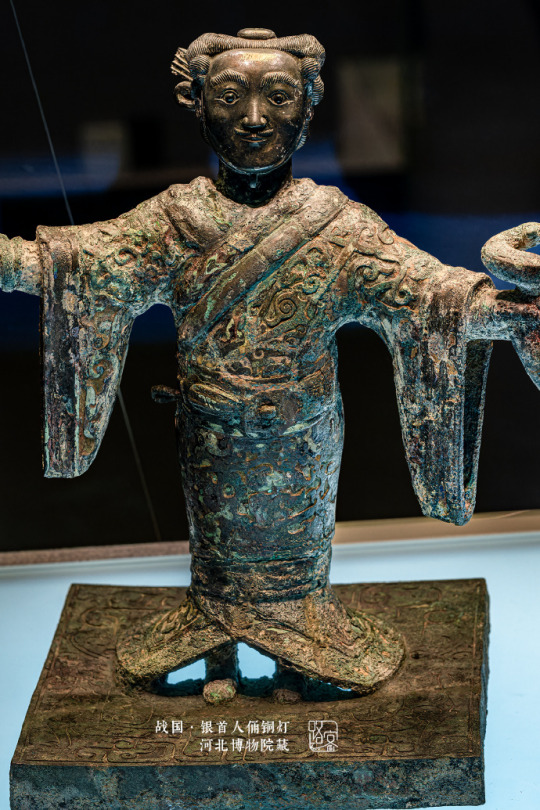
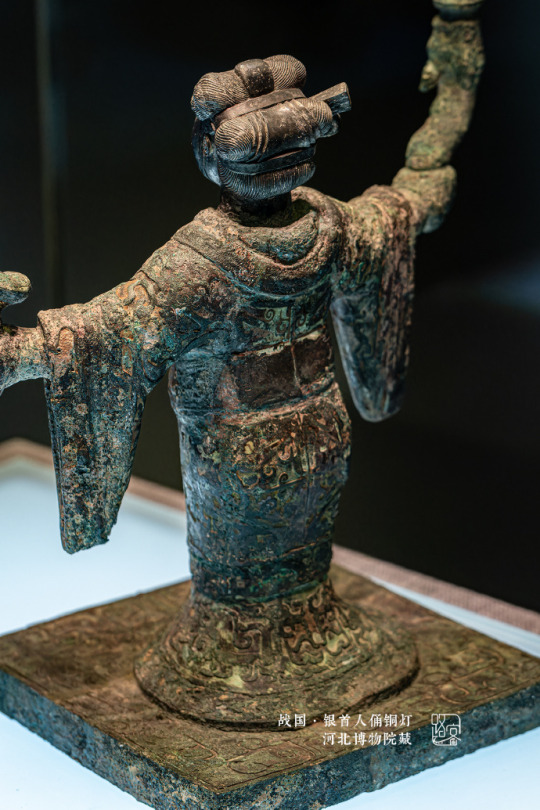
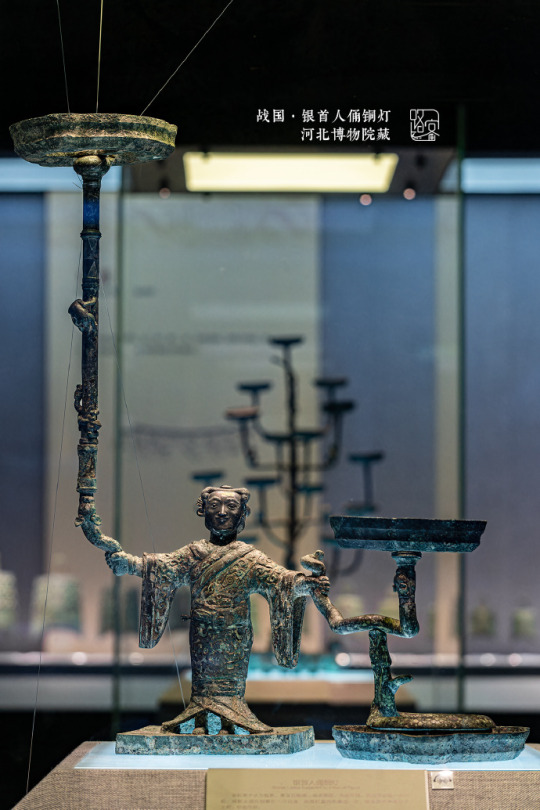
The figurine of a man dressed as a woman holds a snake in his hand, and 3 snakes correspond to 3 lamps.
Sword of Goujian/越王勾践剑:
The Sword of Goujian (Chinese: 越王勾践剑; pinyin: Yuèwáng Gōujiàn jiàn) is a tin bronze sword, renowned for its unusual sharpness, intricate design and resistance to tarnish rarely seen in artifacts of similar age. The sword is generally attributed to Goujian, one of the last kings of Yue during the Spring and Autumn period.
In 1965, the sword was found in an ancient tomb in Hubei. It is currently in the possession of the Hubei Provincial Museum.

【Histoty Note】Late Warring States Period·Noble Women Fashion
The attire of noblewomen in the late Warring States period, as reconstructed in this collection, is based on a comprehensive examination of garments and textiles unearthed from the Chu Tomb No. 1 at Mashan, Jiangling, as well as other artifacts from the same period.
During the late Warring States period, both noble men and women favored wearing robes that were connected from top to bottom. These garments were predominantly made of gauze, silk, brocade, and satin, with silk edging. From the Chu Tomb No. 1 at Mashan, there were discoveries of robes entirely embroidered or embroidered fragments. The embroidery technique employed was known as "locked stitches," which gave the patterns a three-dimensional, lively appearance, rich in decoration.
The two reconstructed robes in this collection consist of an inner robe made of plain silk with striped silk edging, and an outer robe made of brocade, embroidered with phoenixes and floral patterns, with embroidered satin edging. Following the structural design of clothing found in the Mashan Chu Tomb, rectangular fabric pieces were inserted at the junction of the main body, sleeves, and lower garment of the robe. Additionally, an overlap was made at the front of the main body and the lower garment to enlarge the internal space for better wrapping around the body curves. Furthermore, the waistline of the lower garment was not horizontal but inclined upward at an angle, allowing the lower hem to naturally overlap, forming an "enter" shape, facilitating movement.
The layered edging of the collars and sleeves of both inner and outer robes creates a sense of rhythm, with the two types of brocade patterns complementing each other, resulting in a harmonious effect. Apart from the robes, a wide brocade belt was worn around the waist, fastened with jade buckle hooks, and adorned with jade pendants, presenting an elegant and noble figure.
The reconstructed hairstyle draws inspiration from artifacts such as the jade dancer from the late Warring States period unearthed at the Marquis of Haihun Tomb in Nanchang, and the jade dancer from the Warring States period unearthed at Jin Village in Luoyang. It features a fan-shaped voluminous hairdo on the crown, with curled hair falling on both sides, and braided hair gathered at the back. The Book of Songs, "Xiao Ya: Duren Shi," vividly depicts the flowing curls of noblewomen during that period. Their images of curly-haired figures in long robes were also depicted in jade artifacts and other relics, becoming emblematic artistic representations.
The maturity and richness of clothing art in the late Warring States period were unparalleled in contemporary world civilizations, far beyond imagination. It witnessed the transition of Chinese civilization into the Middle Ages. The creatively styled garments and intricate fabric patterns from the Warring States period carry the unique essence, mysterious imagination, and ultimate romanticism of that era, serving as an endless source of artistic inspiration.
--------
Recreation Work by : @裝束复原
Weibo 🔗:https://weibo.com/1656910125/O6cUMBa1j
--------
#chinese hanfu#Late Warring States Period#Warring States period(475–221 BC)#hanfu#hanfu accessories#chinese traditional clothing#hanfu_challenge#chinese#china#historical#historical fashion#chinese history#china history#漢服#汉服#中華風#裝束复原
285 notes
·
View notes
Text
Fluff + Crack | L&DS x Reader Rizzing Them Up With Slang
Xavier, Zayne, Rafayel

Are you guys rockin with my photo editing skills or what LMAOOOO I laughed very hard while making this
CONTENT Fluff, crack, flirting with love and deepspace men by calling them handsome, implied feminine reader in Rafayel’s because he calls you pretty lady, CHARACTERS ARE 18+
AUTHOUR NOTE HELLO so I tend to play games like Genshin, Tears of Themis, and L&DS in mandarin because it’s the games native language and I speak mandarin so it makes me happy and comfy hehe. So basically I was thinking that if the characters call you things like “xiao jie” (english = “little lady” or “darling”), you could call them something like “shuai gei” (english = “handsome guy” or “lady-killer/papi”) LOL

You see him reading on the couch in your shared apartment as you’re preparing for a date. He’s waiting for you and looks amazing so you say:
“帅哥~, 准备好了吗?” Pinyin: “shuài gē~, zhǔnbèi hǎole ma?” English (direct translation): “handsome guy~, are you ready?” English: “hey papi~, are you ready to go?”

Xavier/Shen Xinghui
He looks at you blank faced and then starts to sound out the word, trying to understand what it even means. He raises an eyebrow and says he understands that you’re saying he’s handsome but…??? So you end up explaining it to him anyways (he’s such a boomer but it’s cute because he’s YOUR boomer <3). You tell him that he indeed looks handsome and you just wanted to let him know in a funny way. He nods, smiles, and then thanks you. He puts his hand over yours and reaches the other hand to cup your cheek, making sure that you know he thinks you’re so pretty. As you giggle in response you can both feel your hearts fluttering as you press your lips together.
Zayne/Li Shen
He looks at you deadpan, almost mildly offended (teasing rizz), before going back to his book. On the inside he’s trying not to laugh because he always loves your antics and will only play dumb to tease you (he’s secretly a just a silly lil guy). You try to keep using the slang but he just continues to say “I don’t know what that means, say it properly.” You refuse because you’re pretty sure he knows this slang. After a few more tries you let out a huff and mutter something about just wanting to compliment him for being handsome or whatever while pouting. He finally breaks and chuckles, saying he loves your expressions while snaking his hands around your waist. You start to argue back but he cuts you off with kisses on your forehead, hands, and finally, lips.
Rafayel/Qi Yu
Raises an eyebrow, slightly shocked, but then makes a proud face and pretends to hair flip (zesty). He smirks because he knows what you’re getting at and he wants to make you say it again. He cups a hand to his ear facing you and flutters his eyelashes at you and says “sorry, I didn’t catch that.” You laugh at his silliness before a lightbulb appears above your head. You walk closer to him and lean down to his ear and say it again, slowly and seductively. His eyes blow wide open and he blushes hard, his face and ears turning red. He stutters and then coughs into his hand. He reaches out to grab your hand and leans his other arm on the back of the couch (nervous rizz) and says:
“对, 准备好了, 我的美女~” Pinyin: “duì, zhǔnbèi hǎole, wǒ de měinǚ~” English (direct): “yes, I’m ready, my pretty lady~” English: “yes, I’m ready to go, mamacita~”

|| MASTERLIST ♡ || This was really fun to make LOL thank you for reading! ||
#love and deepspace x reader#love and deepspace fluff#xavier x reader#zayne x reader#rafayel x reader#xavier fluff#zayne fluff#rafayel fluff#j's silly ramblings
269 notes
·
View notes
Text
Ink!Sans Cultural Character Coding (OUTDATED)
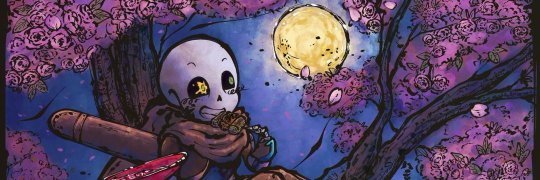
art by @/sakuramochi64 on twitter
Disclaimer!
This post is meant to present and analyse obvious and obscure East Asian (Jpn-Chi) ethnic and cultural influences on Ink!Sans character. If any of the material in this essay is incorrect and/or considered morally offensive, please contact me!
Ink!Sans by @comyet
↓↓↓↓↓↓↓↓↓↓↓↓↓↓↓↓↓↓↓↓↓↓↓↓↓↓↓↓↓
/Despite the fact that Ink is a non-human monster skeleton character, he is often portrayed with human-like traits and characteristics that range between a bunch of topics. One of them that's portrayed as very predominat to his character is his etchnic cultural background/inspiration. Again, this post is meant to analyse and to discuss such inspirations and how it affects his character./
.
.
.
INSPIRATIONS
According to Ink's creator, Comyet, the concept of Ink!Sans was conceived by a Japanese and Chinese ink calligraphy brush. These are known as Fude brushes (筆) and Xuan brushes (宣笔 Xuān bǐ) respectively. This ultimately inspired his ink abilities and powers, just like his concept of being an 'artist' (In simple words, it inspired Ink as a whole).
'The history of ink brushes and the ink material is a long and complicated journey to cover, but it's important to know that these were invented in ancient China around 300 B.C (traditional Chinese: 毛筆; simplified Chinese: 毛笔; pinyin: máo bǐ) and are used in a vast variety of East and Southeast Asian countries, like Korea; Vietnam and Japan.
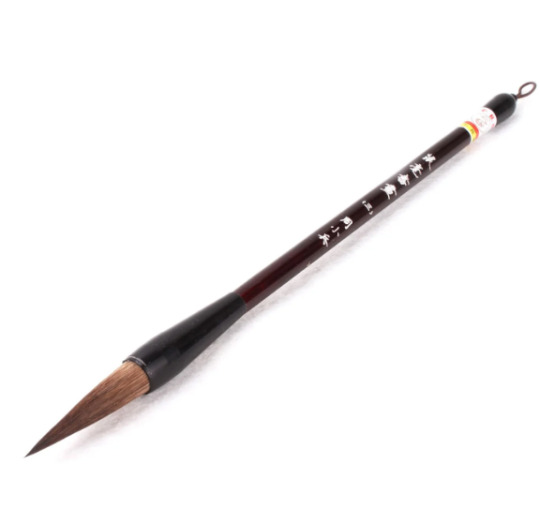
example of the brush Ink!Sans was inspired by.
At glance, ink (the material) is an enduring medium that still surrounds society till this day and it's used in multiple cultures across the world.
Writing with ink calligraphy brushes are common in the Europe and the Middle East as well, but the material was crafted of iron salt and oak galls. When written, ink is often a dark color but fades to brown tones of rust'. Such phenomenon was detectable in the Middle Eastern Bible manuscripts and even ancient European literature as an example.
Ink!Sans was based of the ink material created in East Asia, most commonly made with carbon-base black substance, which preserverd the dark coloration even after hundred of years.
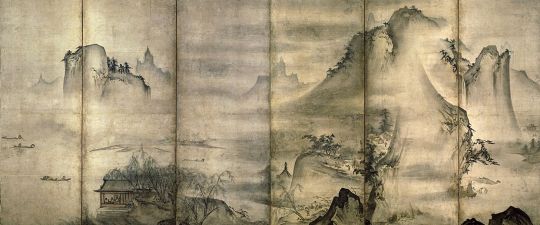
↑ Example of an ancient Japanese painting, such arts are called 'Sumi-e' (Japanese, 墨絵) or ' Shuimohua' (traditional Chinese,水墨畫).
Unlike iron gall ink, carbon based inks are still very common to this day.
'Throughout the long history of East Asia, writing with ink was a very important ability to have. The Materials were made with precision, long traditions of training in calligraphic skills were developed, and writing and literacy were often wrapped up in questions of social status and class.
Although the development of major Chinese calligraphic scripts was completed by the fourth century, the art of calligraphy continued to evolve over the millennia. Master calligraphers with years of training and dedicated practice were recognized for their personal styles, and later generations of artists often adapted brushstrokes and designs to their own style. This stylistic evolution of scripts continues to enliven Chinese calligraphy to the present day.
Calligraphy was an important mark of personal learning and aesthetic sensibility in Japan. Portable, lacquered wood boxes were designed to hold an inkstone and water dropper in the base, with trays to hold writing brushes and solid ink sticks. Inkstone boxes (硯箱,suzuribako 'ink stone box' ) could be easily carried to a pleasant location, even outdoors in fine weather, to write correspondence, diary entries, or poetry.'
Fun fact: Ink's font 'Note This' is inspired by such ancient writing.

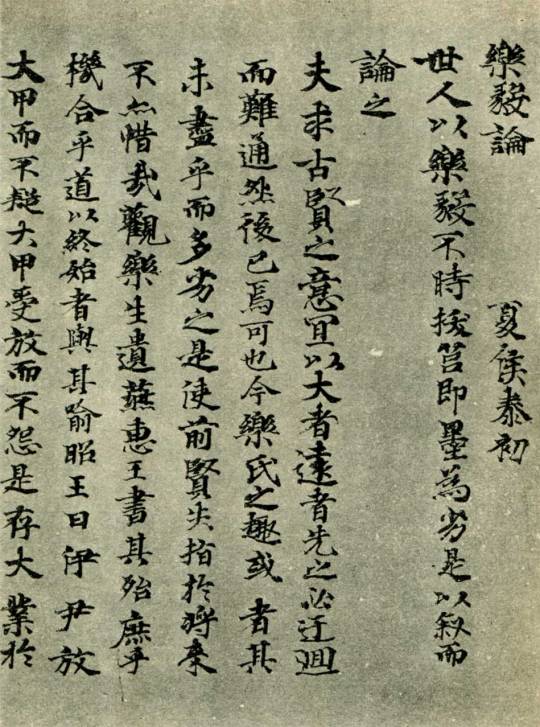
Example of Ink's canon speaking font and Japanese calligraphy (書道, calligraphy)
'However, when it comes to the subject of painting with the material, different schools of painting existed in China, the scholar-painters of Song-dynasty China generally preferred ink-based paintings over the more colorful, pigment-filled paintings produced historically and at the painting academy. Chinese painting manuals and commentaries from the Song (Sung) and Yuan dynasties (rarely mention pigments, possibly because it was assumed a painter’s skill shouldn’t depend on the use of colors.
Japanese artists are known for using media appropriate for the subject matter. Images depicting traditional Japanese narrative tales were typically rendered in opaque colors with outlines created in ink and later obscured by color overlay. Ink monochrome was closely associated with Chinese styles, particularly those transported to Japan via Zen Buddhism. Ink-based forms created with modulated strokes and layered washes suggested introspection and spiritual exploration.'
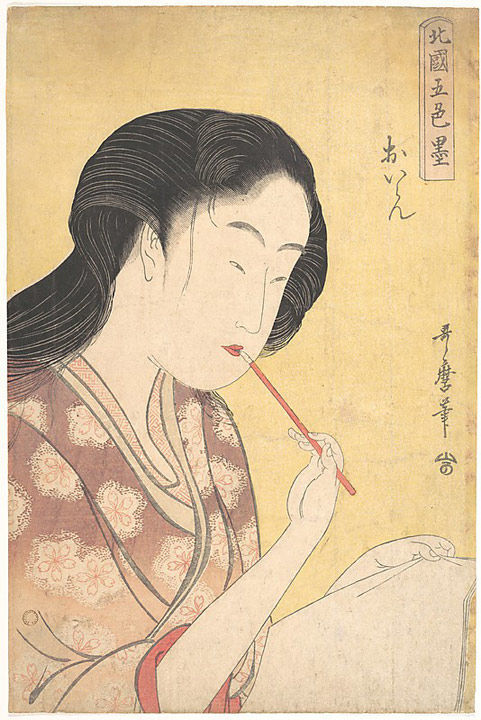
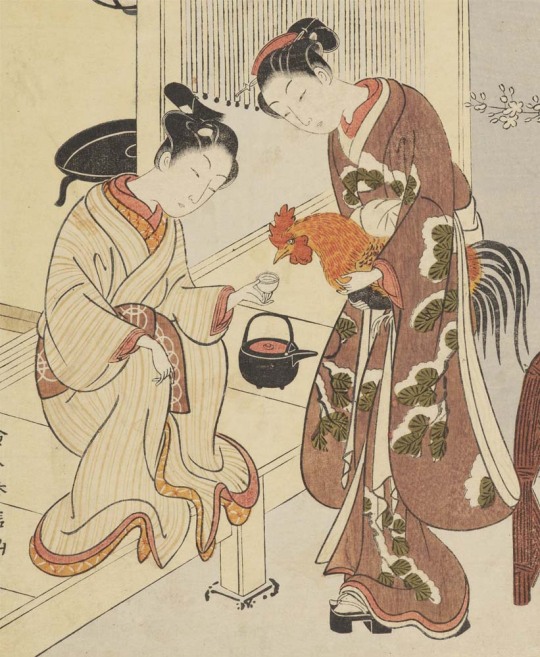
Ancient Japanese paintings that uses dull colors and ink outlines.
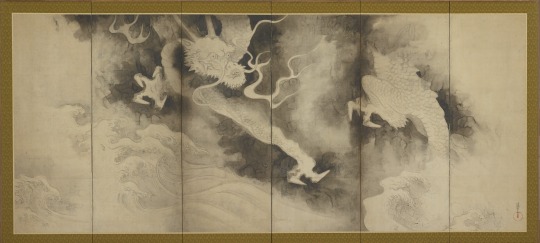
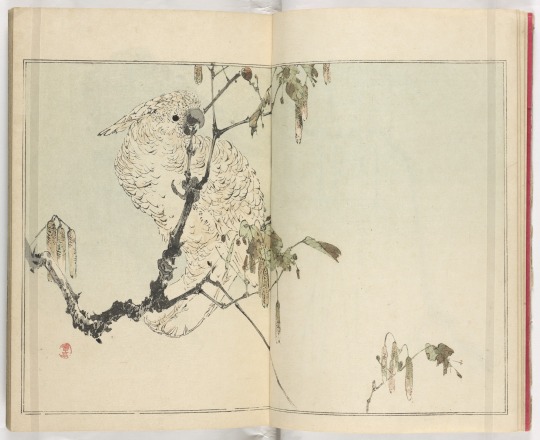
Exhaustive examples of ancient Ink paintings. Dragons and Clouds 雲龍図屏風 (左隻)and Seitei kachō gafu 省亭花鳥画譜
.
.
.
DESIGN
Also clarified in an ask on her main blog, Comyet describes that traditional Japanese clothing inspired Ink's 2020 outift redesing, such inspirations are very obvious in first and second analysis.
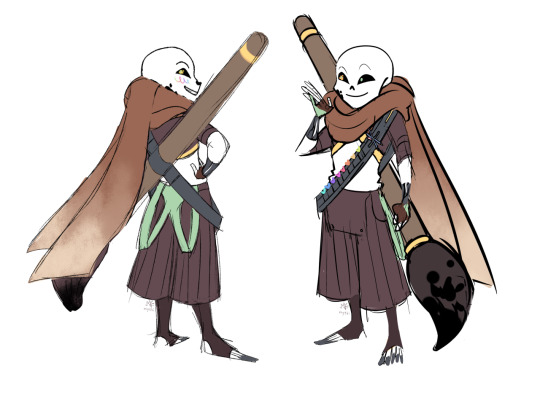
Ink!sans reference sheets for the 2020 design, which can be found in Ink's official F.A.Q
Starting off, the pants.
Ink's pants were inspired by Hakama pants (袴), a traditional Japanese garment designed as a skirt-like pants often worn over any type of kimono. His pants seems to be inspired by umanori (馬乗り)Hakamas, whose had a division in the middle and often used in horse-riding activities.
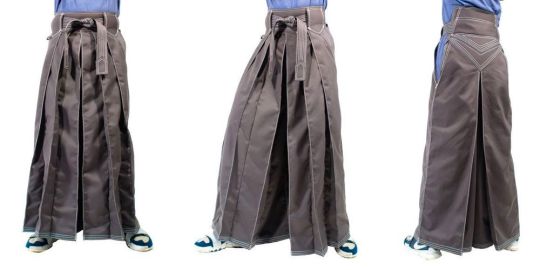
Example of a Hakama.
The Hakama is a wide pleated pants (seven pleats, five in front and two behind), with a rigid backrest (腰 板,koshi ita) placed at the level of the lumbar region. It is tightened with four straps, on the left and on the right, as well in front as behind.
Historically, the origins of the Hakama dates back to the Sui and Tan dynasty were this garment was worn by the Chinese imperial court. Later, the Hakama exported itself to Japan during the Kamakura period (1185 to 1332) and became a traditional garment for the upper classes of Japanese society as well as for samurai warriors who wore it over a kimono (Hakama-shita).
During the history of Japan, the Hakama took on different styles and was mainly made for men, although in the beginning it was a unisex garment. During the Asuka and Nara era (6th to 8th century), the Hakama came in two versions. The first one was open on the front and was tied on each side of the waist with two straps. The second one was open on the left side and closed on one side only.
During the Edo period, the Hakama was worn by the nobles as a complement to the outfits of the time such as the noshi and the kariginu (狩衣; a sleeveless jacket with very pronounced shoulders). Very functional, these pants were also adopted by samurai warriors who usually wore them as Kamishimo (上下/裃). It is a combination of kimono, Hakama and kataginu. When the warrior visited the shōgun, he wore a Hakama called naga-bakama which greatly restricted his movements.
Edit:Currently, hakamas are both worn by men and women.
However, under the scarft, Ink also seems to use a jacket that features a collar that has striking similarities to a Mandarin collar (or Mao collar)

Ink!sans reference sheets for the 2020 design, which can be found in Ink's official F.A.Q
Mandarin collars originated in ancient China and were worn by Qing-era bureaucrats.
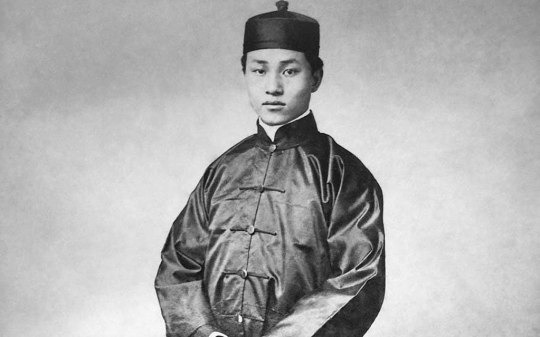
Picture of a Chinese man in a traditional Mandarin collar (early 1900's)
These are short, stand-up collars and sometimes fasten in the center with a small hook. Such collars are still used today for both fashionable and practical reasons. One example of modern usaged of the clothing is seen in the U.S Amry combat uniform, that features a stand-up collar of Chinese origin.

Picture of the U.S Army combat clothing
Regarding of color palette, Ink!Sans redesign uses soft but dull colors and a sinple silhouette and fabric for the outift, such design choises are similar to male kimono's dressing codes which uses dull colors (like dark blue, grey, green and occasionaly brown). Male kimonos are always more simple in design compared to female kimonos.
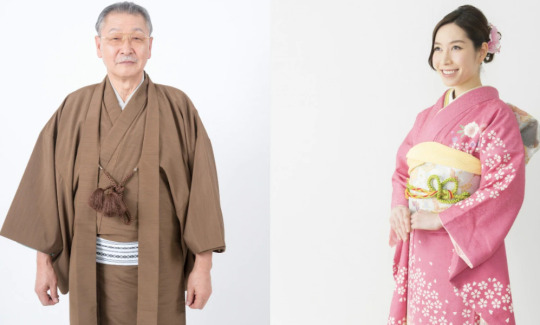
Photo that shows the difference of kimonos used by men and women
Although not specified, Ink seems to wear brown thigh-high socks, also known as 'tights' under the outfit. Japan has a long-standing cultural tradition of wearing such piece of clothing, this trend is particularly popular among young people and is often associated with the "gyaru" subculture, which emphasizes fashion, beauty, and individuality. Additionally, thigh-high socks are often worn with school uniforms, and are considered a symbol of youth and innocence. Additionally, it is also considered fashionable and trendy in Japan, and you can see many young people wearing them.
In regards of physical appearance, Ink also seems to follow ancient Japanese and Chinese beauty standarts, specially one's targeted towards women.
In ancient japan, specially towards the Nara (奈良時代, Nara jidai), Heian (平安時代, Heian jidai) and Edo period (江戸時代, Edo jidai) the beauty standarts for Japanese women were of those with slim eyebrowns, flat oval face shape and narrowed eyes.
Such attributes can be observed on Ink!Sans apperance.
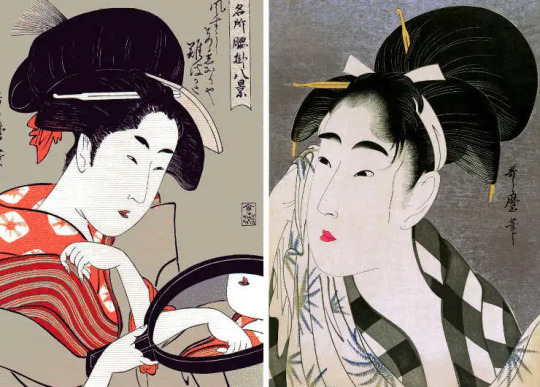
Visual representation of old Japanese beauty standarts
/Keep in mind that some of such standarts presented are now out of fashion due to the westernization of asian countries. Specially regarding eye shape/
.
.
.
MUSICAL THEMES
Ink!Sans has a long history of being associated with East Asian music, specially those of Japanese origin.
Themes that comyet associated with him includes, 'Code Wu- Asia River Album 江水/Asia River' ( post can be found here), 'Dullahan under the willows' and 'Futatsuiwa from Sado (二ツ岩で佐渡) both from the japanese game 'Touhou'. (post can also be found here.
He's also associated with East Asian musical instruments, something quite noticeable in Ink!Sans theme for the the web-series 'Underverse'. Such theme is called 'Brushwork'.
The theme starts with an instrument similar to a Shamisen (Japanese-三味線) and a Guzhen (Chinese-古筝) and also uses a traditional flute.
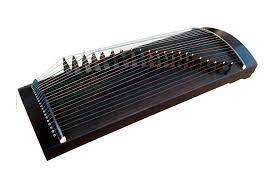
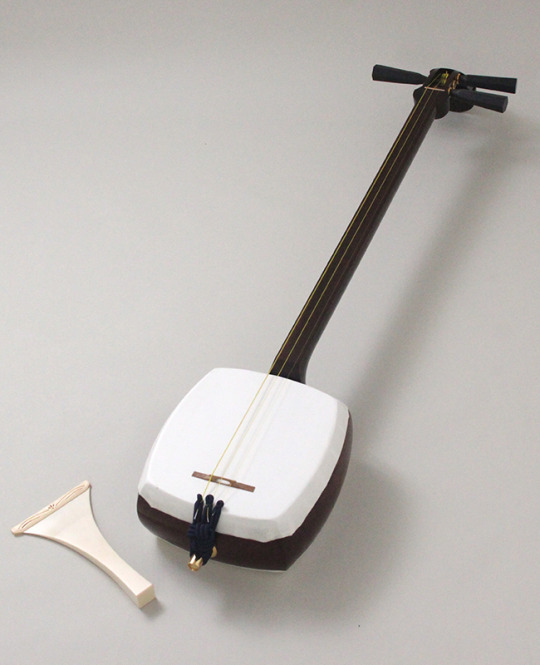
Photo of a Guzhen and a Shamisen, respectively
.
.
.
TRIVIA
On Underverse's opening for season 2, Ink!Sans can be seem between a field of Sakura trees or Cherry Blossoms (桜).
Cherry blossom trees are an icon of Japan. Some people even call the cherry blossom Japan’s informal national flower. The Japanese school year starts in April, during cherry blossom season. The flowers symbolize good luck, love, and springtime. Since they bloom for such a short time, cherry blossom trees also represent human mortality. They remind us how short and precious life is.
In the same series, Ink is also drawn in a Sumi-e inspired style for the 'Soulless Heart Instrumental' video. Such artwork features Japanese writing in black ink.
Ink's canon instrument is the flute. Although invented in ancient germany, the flute is highly associated with East Asian cultures and it's music, chinese and japanese culture are the main ones . Other than that, Comyet already made a connection to Ink's asian influence and the instrument itself.
According to research made by the University Microfilms International (UMI) affirms that the moderny performance and melody of the instruments has clear East Asian roots, mainly from Chinese and Japanese style of music.
'The flute is a particularly appropriate instrument for such a
study because of its versatility of pitch and timbre, the latter being
one of the most important elements in Eastern music; it is capable of
'pitch-bending' and infinite changes in tone quality which are impossible
to achieve on instruments of set pitch.
The flute music selected for stud/ shows varying degrees of Eastern
influence. Depending on the nature of the composition, the Eastern
elements may be extremely subtle and difficult for the untrained to
decipher; in other instances the composer makes clear those sounds or
concepts with Eastern roots, either through accompanying explanation or
within the context of the music.'
Sources
1.National Museum of asian art (materials & techniques. Ink section)
2. Asian Brushpaper (an-overview-of-chinese-ink-history)
3. Wikipedia (wiki Hakama-pants)
4. Aikido Journal (Hakama-101)
5. Wikipedia (Mandarin-collar)
6. Kirrin finch (What-is-a-mandarin-collar)
7. University Microfilms International (UMI) (east-asian-presence-in-modern-flute-music)
#ink sans#inktale#undertaleau#utmv au#ink!sans#utmv#inksans#undertale#east asian#au sans#sans au#cultural inspiration
433 notes
·
View notes
Text
Hopefully Mostly Accurate Translation of the Link Click Art Book Interview with Director Li Haoling
thank you very much to @yingdu-lover for the initial post+tag and also the interview!!
I made a chinese transcript of the entire interview and goddamn it was 4 Google doc pages long 😭this is going to be a long post but let's go :)
Blue text=interviewer, white text=Director Li (small text=little translator notes. don't worry they won't pop up too often :))
About the production team and production process
Q1. The main production team of Link Click is an internationalised lineup, can you introduce the members of the team and their usual responsibilities to the readers?
---About Link Click's main production team's structure, I am the screenwriter and director, the executive director is (Zhang) Yuxia, his position is equivalent to the assistant director. Our work distribution is I mainly work on content creation and overall control; he leans more towards communicating, interacting and executing the created content. The members in the country (China) also include Studio LAN, who have overall control of the production process. Their work includes Chief Producer, original design, mid-term character modeling et cetera. Besides, there are also our colleagues in the Japanese branch taking part in and leading the post-production work.
As for the pre-production process of the show, INPLICK-laoshi* from Korea was in charge of the character design. She is a very well-known illustrator. On the art aspect, since we have previous cooperation experience with Shinkai Makoto-laoshi's* team, the process was quite enjoyable, and we established a long-term cooperation relationship, so this time we also invited Tanji Takumi-laoshi* to help with the art supervision and design; whereas Tenmon-laoshi* is in charge of the music. This is roughly our team configuration.
*In the original interview, Director Li added -老师 to the ends of the names of these other creators. Much like Japanese's sensei, this is used as an honorific, used to indicate respect. I don't think there's an English equivalent for these honorifics, so I kept them in rough Pinyin 🥹 I'll keep it like this for the rest of the translation too
Just now you said the assistant director was Yuxia-laoshi, is this the same person as Yu Xia from episode 2, "Secret Recipe"?
Correct. Actually there are a lot of character names in the show that are the same as our friends at work. But in the real world, Lin Zhen and Yu Xia are two guys. They're college classmates.
*Director Li says 工作里的小伙伴 in the part that says "friends at work", and 小伙伴 directly translates to "little partner", so it's like a bit cuter? lol :') also noodle lesbian name lore?!?!
Q2. Sounds like the team atmosphere is quite relaxed, can you further introduce how the usual work atmosphere is? And how is the state/condition when communicating with overseas teams?
---Because Link Click is an original donghua, so there is a higher freedom in the creating process. Like the part with using the names of work friends as character names, I also think it is more relaxed this way, and more meaningful. As for communicating with overseas teams, because we have a greater experience in cooperating with overseas teams, the process is quite smooth. For example, we have had several indirect cooperations with Tanji-laoshi from the Shinkai Makoto team. At the time, we mentioned that we wanted to do some new challenges and content, and they were willing to take part in it, they also thought it was something new and were very interested. The more novel it is, the more enthusiasm they have to give it a try.
Q3. Going back to Link Click, what was your (Director Li's) original intent during the creation of Link Click?
---At first it was because I saw a photo one time, that time I thought the people in the photo were particularly happy, but the person looking at the photo was not that happy. At that time I felt that photos were quite a unique thing, through a piece of paper, it connects two different worlds, different states of yourself. Because of this feeling, I got the idea of using photos as a base for a story's script, and then from there, I thought about if I could go back to a certain scene or time in a photo, what kind of feeling would I have. I took the thoughts I had while trying to figure out this kind of feeling and expanded them further, and it slowly formed into Link Click's overall story.
Q4. The impression that photos give us is mostly warm, so how come you thought of using a theme that carried some suspense to fill in each episodic story?
---If we're talking about only setting an ability that can enter photos, I imagine there definitely isn't a shortage of similar themes, so I wanted to include an even more interesting setting.
Take the point of entering a photo to change the past and save the future for example, there are actually many ways to travel through. When setting the plot, my first thought was to separate/disassemble this ability. The more imperfect the ability, the more it can create changes and plot conflicts. Like how we see that even though Cheng Xiaoshi can enter photos, but he doesn't know what will happen in the photo, so him inside the photo will become an unstable factor; whereas Lu Guang is outside the photo, he can see what is about to happen in the photo, but he has no way of completely controlling Cheng Xiaoshi's actions. Both of their abilities are imperfect, so they must cooperate to sufficiently utilize each other's effect. I expanded the later plot based on this point.
Additionally, about returning to the last through photos, that itself already carries many elements of suspense. Everyone probably has had this experience before: you're all smiling when the photo is taken, but the you at the time might not actually feel like smiling, deep inside. In that photo, everyone looks very happy on the surface, but maybe there are different thoughts in everyone's hearts. It's actually quite interesting. To me, this is also a kind of suspense - what's the real meaning behind the photo?
So a conflict between appearances and the inside?
That's right. What's truly beneath those appearances, the process to unearth this in itself will carry suspense, I suppose this is also a main point that I abided by when I designed the story to go towards suspense. This is one of the reasons. Another point is that there are very few donghuas in the country (China) that use a suspense theme, I wanted to try to break through, and do a fresh theme.
Q5. Link Click is in the form of an episodic show, with every episode having a different story, what is your original intent when picking stories? What is your starting point?
---Some stories were already thought out, but actually every story was not "picked out", but instead expanded from several angles. For example, the story of "Farewell" (s1e5 T_T) first had a narrative inspiration: everyone says going back to the past is to change the future, but if you went back to the past and made changes, only to find out in the end that nothing had changed in the future after all? I will assume this situation: it changed, and yet it didn't. As long as there is this hypothetical, there will be a lot of plot conflicts. The emotional level will also be very high. I think this is a plot core for having something interesting happening, and the story "Farewell" sprouted from this point.
Let's take another example of the special episode, "Marrying by Contesting". It originated from a story I read before. At that time there was a news report, saying that in a certain place, a girl was banned from something by her family*** and gave up her whole life. After reading, it left a deep impression on me, something like this actually happened, so I used it as a main theme to create. And the episode about kidnapping, "Aunt May" as well, I hope that through this donghua I can not only show entertaining content, but also embody some social value.
***GUYS IM SO SORRY for this part, the word was NOT eligible in the picture of the interview log 😭the closest (and only) thing I could think of when I saw that blob of pixels was the word 锠, but the phrase 禁锠 had no meaning. I looked it up. Nothing. 禁 means ban, so the general meaning of the sentence is that the girl's family banned her from something and she gave up on her life. I don't know what they banned her from 😭 so sorry once again
Q6. From the OP and ED, we can see that Link Click's art style is quite intense, how did you think of using this kind of style to make a donghua?
---About the style of the OP and the ED, the earliest intention was to create a sense of trendiness. I invited many teams to work together with, like INPLICK-laoshi, her art style can give people the impression of trendiness. Aside from characterization, the backgrounds were also considered to be stylised a bit, and not just done in a realistic style, because a realistic style will make it look heavy and serious. I hope that the backgrounds can be made to have more personality, more tactile, with a more artistic effect, so I discussed it with Tanji-laoshi and the artistic design done with this target in mind had a stronger drawing sense.
Q7. In the episode "Marrying by Contesting", a quote by Edward Weston appeared, and we understand by communicating with the team that there is a quote in the beginning of every episode, what is the purpose of this setting?
---Because we're making a theme based on photos, so I hoped to take the quotes of world-famous photographers and pick appropriate quotes for each episode, it's mainly an expression of form.
When I saw that line I felt quite moved, I was touched.
Yes, we had this intention. The intentions of animators making animations are the same, people who like the content often have this kind of empathy, we all hope to unearth the differentness of the world through our content. Just like how war photographers are willing to give their lives to document reality, to be able to capture that moment in time with your own life, that spirit is quite a great thing.
Q8. We heard that the donghua had been accepting fans' commissions since it began airing, and the donghua also showed everyone's submissions and story collections, like the Time Photo Studio really exists, can you talk about the purpose of this setting?
---This was the first thing we thought of. We could really open a Time Photo Studio and find real-life stories, restore them, help people complete their commissions. I think this is rather romantic. We have also been doing this continuously, collecting everyone's stories, be it in the mini-theatre series (it's The Daily Life in Lightime chibi series!) or in the later plot, we'll show them in future parts. The saying of "breaking the fourth wall" might be a little cliché, but it does indeed have the feeling of breaking "the fourth wall".
About the characters and the setting
Q9. This question may have been asked quite a few times on other occasions, how did you (Director Li) decide on using a double male protagonist setting like with Cheng Xiaoshi and Lu Guang?
---As I mentioned earlier, I wanted the powers of the protagonists to be imperfect. The abilities must be split into two halves and be distributed to two separate people. This is the first point. Secondly, we had discussed at the time, if it were a male-and-female setting, putting the two characters together will have one problem: should we give them a romantic storyline or not? Later on we found that this problem was too complicated/troublesome, and couldn't be resolved well no matter how we tried to do it, and there were things to consider in every aspect of the matter. So in the end, we ended up with the double male protagonist setting that we have now.
Regarding Cheng Xiaoshi and Lu Guang's personalities, I mentioned it earlier as well: Cheng Xiaoshi is an unstable factor, since he can enter the photos but doesn't know what will happen next, whereas Lu Guang is a stable factor. The two of them must partner up and complement each other, then only can they utilize their abilities perfectly.
Q10. About this female character Qiao Ling, how did you (Director Li) adjust the character relationship between them and the interaction atmosphere?
---The audience has always cared a lot about Qiao Ling. Although she doesn't get much screen time, her existence is still very important. To express the kinship* between two boys, this isn't much of a problem, but to make these two boys open their hearts to each other is not as easy. I want to set a link that allows there to be emotional communication between the boys, such as Lu Guang wanting to know how Cheng Xiaoshi sees "me" (Lu Guang), Cheng Xiaoshi wants to know how Lu Guang sees "me" (Cheng Xiaoshi), how is Cheng Xiaoshi's thoughts towards "me" (Lu Guang), how is Lu Guang's thoughts towards "me" (Cheng Xiaoshi), all these thoughts can be converted and conveyed through Qiao Ling.
*(sorry in advance for the long tl note) this "kinship" might be more of a "tacit understanding", which is 默契 in Chinese. I don't think there's an English equivalent that sounds as good, so basically 默契is where people work together so well they don't even need to talk to each other to do something together. Think something like maybe you and your best friend turn around to high five each other at the same time without looking, or when you do the same action (e.g. tilting your head a certain way, saying something, closing a book etc.) at the exact same time in the exact same way. That's 默契 :) in cxs and lg terms, it's them passing the ball around to each other flawlessly and dogwalking the rest of the court without even really looking at each other or communicating verbally. They just do, and they work together seamlessly without even trying. 默契 babyy
Is it equivalent to Qiao Ling between them balancing their views towards each other, balancing the relationship between the two of them?
It isn't balancing their relationship, but rather she is a path for their communication. The communication I mean is core communication between hearts.
Is it the more sentimental/emotional part?
Yes, for example episode 10, where Cheng Xiaoshi possessed Xu Shanshan and listened to Qiao Ling talk about how Lu Guang saw him at the time. This kind of trope can only be conveyed and converted very well through her.
Q11. Among all the characters, who do you (Director Li) like the most?
---This is like asking which of your children is your favourite, it's kind of difficult to choose. You ask which one I like, I can only say I like them all; but saying I like them all, this answer seems kind of boring. I'll be honest, I still like them all, they each have their special characteristics.
Then let's talk about the points of the three main characters that shine/stand out.
Cheng Xiaoshi is righteous, and he's very genuine. He's a very naïve person, and naivety is commendable. In the current society, naivety is becoming increasingly scarce.
Lu Guang is calm, knowledgeable, and very smart and mysterious. He's a rather perfect male image.
Qiao Ling cannot simply be said to just be a "girl next door", instead she has more of a big sister image, and can hold the trio. While she has a rational, strong side, she also has a very soft side, the future plots will also bring out these virtues of hers.
Q13. You (Director Li) seem to have a soft spot for the word "light"(光), what meaning does the word "light" represent? Outside of the donghua, what does this "light" repose?
---"Light" is a symbolic hope, or maybe energy, giving people an uplifting feeling. Personally as a practitioner of animation, the reason I chose such a difficult job was because this job could bring people some direction and light. I also think I'm a little delusional* when it comes to this aspect, the people watching animations usually aren't very old, planting a little bit of light in the hearts of children, I think this is the lovable part of animation and the value of its existence. So at the time I kept bringing up "light", including many characters' names have something to do with light, the theme is also related to light, it all comes from this kind of thoughts.
*he says 中二. which is basically chuuni, for chuunibyou (中二病) and is usually known as "delusional disease" or "8th grade syndrome" but the gist of it (though I think yall know what chuunibyou is 😭) is that he's calling himself delusional here lmaoo
Q13. During the process of creating Link Click, what were the parts where you felt the happiest?
---The happiest part is still the good overall creating atmosphere. The creation of Link Click began in 2019, at that time I had the rare chance of creating without much concern, purely creating for the sake of creating. So Link Click getting everyone's approval in the end is partially because that time the conditions for creating were good.
Q14. Can you reveal some details about Season 2, some details that everyone wants to know.
---Season 2 is mainly suspense. The storyline of pursuing the culprit was a very large tension/cliffhanger in Season 1, Season 2 will definitely go through this tension/cliffhanger till the end. I saw a lot of viewers wish to keep some things from Season 1, such as the episodic stories, and some portrayals of real-life stories. So I'm also thinking of a way to satisfy the condition of Season 2 being suspenseful and following a main storyline while also adding these elements into it.
Will it be more angsty* than season 1?
As the audience, are your expectations wishing for it to be "angsty*" or not "angsty*"?
It's hard to say, this mentality is quite dilemmatic.
Personally, I think a lot of Season 1's content was real-life things, so its "angst*" is an "angst that hits close to home*", akin to the regrets in real life. But in Season 2, since it has a storyline of pursuing the culprit, so some parts with emotional concentration will be different from Season 1, the feeling of "angst that hits close to home*" will be weaker.
*(hoo boy this will be a long one) so the words they are using here are Chinese internet language/slang: 刀, which means knife/blade, is used to mean something that makes your heart hurt when you read it. Yknow, like cxs dying! Chen Bin falling! Chen Bin's wife walking down the funeral hall in her wedding dress! S1e5 in general! That kinda stuff. That's 刀. It makes you cry, it makes you hurt, it makes you sad. So I ended up using "angst" with the definition of the fanfic term here since that was the closest thing with that meaning. With the "angst that hits close to home" part, he used "贴肉刀" which directly translates to "knife that sticks to meat" and like... basically it's blade that cuts you deep (emotionally) because it's something you've experienced? something like that? the closest thing I could think of was "hits close to home" :') sorry this particular section is so confusing. its like 50% chinese slang
Q15. One last question, say something to the readers that are eagerly awaiting Season 2, increase the anticipation.
---Just like the creating process I mentioned earlier, I wish to be able to tell a beautiful story in a quiet, peaceful condition. I also hope the viewers can be more calm when treating/regarding this work, whether everyone likes it or dislikes it, I accept it all, but sometimes the feelings of the audience becomes a form of pressure on the work. The original intent of this work was to present it in a quiet, good condition, so I still hope that in the future, everyone can maintain a level head towards Link Click.
Thank you, Director Li. Thanks for all your hard work.
-interview end-
that's the end of this VERY long post! :'D translating is kinda fun ngl
I tried my best to keep it as accurate as possible, forgive me if there are any mistakes :') (especially the "girl was banned from something by her family" one... ooh. I am on my knees apologising for that one I am cringing at myself)
and also sorry for the longass translator notes in the middle of some segments... I hope it didn't disrupt your reading too much 🥹
82 notes
·
View notes
Text
stuff li aixue says
this is a quick compilation and translation of mandarin chinese segments in exordia, for reference purposes or just the discerning curious reader out there. quotes aren't limited to aixue, of course, but I wanted a catchy title.
I do have the memory of a single-celled organism and am not really skilled at combing through chapters for that one quote, so if I've missed something you're welcome to send it to me to be added.
spoilers ahead.
note: all mandarin chinese bits in Exordia are rendered solely in Hanyu Pinyin and not Hanzi, so I've done some guesswork for hanzi (in places where they're not immediately obvious) based on context.
Chaya's Protocol:
A woman in a red T-shirt trots right past her, headed toward the angel. She’s shooting video on her phone, chattering excitedly: “Jiào tā mén xiān yòng huā cài cauliflower hé xī lán huā tǒng pì yǎn bā, zhè cái suàn shì universality of fractal behavior de lì zǐ!”
=> 叫他们先用花菜 cauliflower 和西兰花捅屁眼吧, 这才算是 universality of fractal behavior 的例子!
ENG: right, tell them to shove some cauliflower and broccoli stalks up their ass then, that's a real example of the universality of fractal behavior!
note: ah, Aixue's memorable entrance. 捅 (lit. poke) 屁眼 (lit. butt) 吧 roughly means 'why don’t you stick it up your ass'. she's insulting the person she's talking about, presumably for saying something incorrect about universal fractality.
-
chapter 33:
Master Sergeant Zhang: Máo gān, zhè shì máo jiān. Wǒ mén xū yào jǐn jí kōng zhōng zhī yuán!
=> 矛杆、这是矛剑。我们需要紧急空中支援!
ENG: High Spear, this is Sharp Sword. We need urgent air support!
-
chapter 39:
Aixue: Wǒmen bìxū yào Pò fǔ chén zhōu… / Bù xíng! Wǒmen bìxū yào pò fǔ chén zhōu!
=> 我们必须要破釜沉舟... / 不行!我们必须要破釜沉舟
ENG: we need to fight to the very end... / no! we need to fight to the very end!
note: Aixue says 破釜沉舟, which is a four-word chengyu (idiom) that roughly means 'to pursue your last resort'; it literally means to sink one's entire fleet in an offensive, and figuratively refers to cutting off your own means of retreat i.e., to fight to the very death and leave yourself no choice.
-
and some trivia on other Chinese phrases:
lala (拉拉): Chinese slang for 'lesbian'. comes from lazi (拉子), from the novel Notes of a Crocodile by famous Taiwanese lesbian author Qiu Miaojin.
T / P: the Chinese counterpart to the butch/femme spectrum. T = tomboy, P = po ('wife') or also pretty girl, apparently.
tongzhi (同志): Huang Lim says this to Chaya. this is slang for homosexual in Chinese, but also means comrade (with historical communist associations), hence Huang Lim phrasing it as comrade first.
Li Aixue: aixue's name itself makes sense once you learn about her whole shtick with prajna, a fact that impresses me because Seth had already set her name into stone as early as the precursor short story for Exordia. just things that make you wonder if they'd planned everything out from the very beginning. anyway, Aixue sounds like 爱学, i.e., 'love for learning'. get it? there are many possible surnames with the hanyu pinyin Li, but my pet theory is that Li = 厉 (lit. 'powerful'), so that putting it all together into 厉爱学 means Aixue is an ultra nerd.
97 notes
·
View notes
Text
@caspertheloudassghost In this universe the old peak lords all ascended right? I imagine the only reason SQH’s vacation lasted this long was due to his officials, finally giving up on understanding SQH’s organized chaos, desperately try to get his Shizun to decode it to not ruin SQH’s first vacation in two millennia. “You re-raised him right? You should know his filing system right? Right?!” (His filing system is entirely based around a version of Microsoft excel that only he can run. He knew this when he left)
XD XD XD Okay, canon on the Microsoft excel idea! But, unfortunately for the Heavenly Officials, they were not brought into being by a particularly lawful god. Meaning that, while they know that their Lord is incarnated somewhere in the world... they have no idea who, where, or even exactly why, because he told them exactly None Of That, specifically so they couldn't interfere.
Not even because they're busybodies or obnoxious coworkers, but because the Heavenly Officials are the original assistants that Airplane made for himself in this world once it got more complicated than he wanted to deal with on his own. As a result, while they're quite good at their jobs (and can manage a very respectable amount of Heaven's filing, just not anything in Airplane's personal system) and very pleasing to look at, they're also a bit clingy. Because they were made by a lonely young man who was mostly ignored by everyone around him in his first life, so who can blame him for wanting to be around people who also wanted to be around him?
Thinking about it, in a way this trip to the mortal world to be Shang Qinghua was probably at least partially for the sake of these original, highest-ranked Heavenly Officials alongside Airplane wanting to take a vacation and experience the Plot firsthand. The celestial equivalent of parents leaving their older kids in charge of the younger kids, the pets, and the house for a week while they go off on a vacation or business trip or what-have-you. A chance to test themselves a little without the person/people in charge on hand, to grow as an individual and an adult. And the Heavenly Official coming down to beg Airplane for help was the equivalent of said teens having to phone their parents five days in because the dog got into something it probably shouldn't have, and it'll probably be fine, but there is also the sudden and very real fear of "Oh gods, what if we accidentally kill the dog?" Basically a chance for them to exert some independence and grow on their own for a little, with an unexpected 'I need an adultier adult' situation popping up a decent way in.
As for SQH's ascended master, you're right, he would probably have been able to help with the filing system at least a little... if anyone had thought to show it to him. As it was, cultivators have been ascending for centuries, the Heavenly Officials have no reason to believe that this latest batch from Cang Qiong know anything more about their vacationing boss than any other human. Heck, the only reason Shang Qinghua gets found is because Shen Qingqiu sees some notes in pinyin during his ten-year check-in as to how he's settling into his new role of God of the Ninth Road (full AU here if you haven't tripped over that segment yet), and he comments on it (on the grounds that he'd been under the impression that it was just some made-up writing system his shidi had invented).
In an amusing twist, the issue that necessitated the Heavenly Officials to crack and call upon Airplane for help? Turning off Binghe's Protagonist Halo. Because the 'story' is over now, so no need for a protagonist, and it's not going to particularly nerf him or anything, just make him less center-of-attention-the-world-literally-revolves-around-me. Long term it's even going to be a good thing, because it'll allow Binghe and Shen Yuan to settle into a life together without having to deal with a new Plot Arc starting every month or two. It's for the best for everyone.
Except all the upper Officials have been through everything over a dozen times, and no one can figure out how to make it stop, Airplane left at least some instructions before he left and all the signs point to it being time to turn off the halo and he forgot to include instructions on how to do that, please don't leave out key information, your excellency-!!!
97 notes
·
View notes
Text
Another thing I wanted to try was actually putting characters to the Lao Mang Lone* Soup.
In the Chinese translation we have 邪魔汤 which is pronounced as Xié Mó tāng which means = Evil Spirit Soup. But I really wanted a direct translation for Lao Mang Lone and, honestly, the funniest option for me is:
老邙龙湯
(Lǎo máng lóng tāng)
OLD MAN MÁNG’S DRAGON SOUP
I’m just imagining some old guy hanging out in the Máng Mountains (which is a place associated with graveyards and death) with his traveling food cart and making this dragon soup when this demon bean shows up to buy a bowl and just:
Old Man Máng (to the tone of the SpongeBob pie episode): you know this isn’t just soup right? This is soup made with dragon. It’s dragon soup…it’s going to make ya evil.
Hannibal: just hurry it up gramps! And give me an extra large serving.
*note on ‘Lone’ translation: there isn’t actually any word in Chinese that has a pinyin of Lone and, given the context of the soup, it’s pretty obvious meant to be ‘Long’ since, you know, it’s dragon soup….(which, in Chinese, is pretty interchangeable in the Lone vs Long pronunciation as far as what is English speakers hear)
**additional note on Mang: there are a LOT of options for what you could use here just depending on what you were going for story wise. I, personally, wanted the connection to the Mang Mountains (邙山)
20 notes
·
View notes
Text
Musical Observations about «Wo Men»
It's been two months since Xiao Zhan dropped Wo Men, and it's high time I post this! When I heard Zhanzhan would release a full album, I expected a high-quality but run-of-the-mill mandopop album. I would no doubt love it, but I would love it because it's his voice.
And then we got THIS.
These are things this vocalist has noticed during my obsessive re-listening. I've used XZS's official pinyin titles (I'm thrown off by the official English translations 😅).

1. Borrowed chords in the first song
The song Wo Men is in minor key, but uses borrowed chords, or chords which it shares with its relative major. This is what makes it sound so eerie. Modal interchange is used for tension; the haunting, unsettled feeling as your brain contends with overlapping patterns from 2 key signatures.
I think it also works particularly well with the song's theme, this crossroads between hope and despair, questions about whether cruelty is an inescapable state for humanity.
I also love that this is the first song. We start with unsettling questions and end the album with gratitude as the night ends. He ordered the songs very deliberately, and it makes so much sense that Zhanzhan would organize it this way, a journey toward hope.
2. Diverse vocal techniques
The songs of this album give him a variety of vocal contexts, to show different versions of himself. He is a singer who can take advantage of that, and he's shown it.
For instance, in Douyi Yang there are a lot of opportunities for embellishment that he didn't take, on purpose, and the execution is beautiful. He leans into more sustained straight tones instead of vibrato. Showing us that vocal control.
Lemme talk about pitch correction for a second. One of my roommates overheard me listening and joked "his voice sounds like Michael Bubble." I don't listen to much pop music, but I do know Michael Bubble has a reputation for being autotuned, so I was a little offended. 😅
But Xiao Zhan's vocal quality is smooth without synthetic help, and we know that for several reasons.
For one, his live performances are smooth, which is not a result of corrections because he has a tendency to start half a tone off. If they were correcting anything, that would be easy to do and the first thing to change.
(It's a common struggle to start half a step off when performing live. Singing is done both by ear and by feel; but your instrument feels different when you have a burst of adrenaline tightening your muscles and changing the length of your larynx, altering its resonance. Back before he knew how to adjust his in-ear correctly, he often took the left ear out so he could quickly fix his key. He still does this sometimes; it always makes me fond.)
Another reason is that you can hear small vocal anomalies -- the natural blips of a human voice. Everyone has these and it's the reason why skilled singers may choose to autotune. (Personally, I think this is unnecessary, but that's a Whole Essay.) Those vocal anomalies show up in his previous songs and performances, and also in this album.

All that to say, his voice really is that smooth.
Which isn't to say they didn't do any pitch correction. I could see it going either way:
Pitch correction is the current trend in music production
On the other hand, he hasn't used elsewhere that we're aware
On the other other hand, he's never done a project where he had this much control
If there is pitch correction, it is minor. Douyi Yang is a potential candidate to me, not because of the straight tones, but because of how perfectly matched his harmony is in the chorus, where the timbre he's using could sound sharp if the harmonies were at odds. Either Zhanzhan absolutely nailed it (possible!), or they used pitch correction on the harmony line.
I really like the "realness" to Xiao Zhan's voice. In Yexingren Dezibai and Guiling, for example, you can hear small hiccups in the lower notes. They didn't correct those. I really appreciate that.
It lets his talent come through.
3. Syncopation
In Huan Yuan, he does a lot of releasing on the half-beat. Syncopation is a common technique, but doing it through an entire song is hard. Holding through every half-note, counter to the song's rhythm over and over, takes focus.
4. His own backup vocals!
I LOVE THAT HE DOES HIS OWN BACKUPS AND HARMONIES. You could tell in some songs right away. There were others like Piaoliu and Dengta where I wasn't sure, and then we got the 20min of bts footage which confirmed it.
They're beautiful: he's good at harmonizing after all! (I love BTS set videos where he makes harmony up on the fly, SUCH a choir kid thing.) Another way for him to show his vocal chops. It also makes this album all about him; I don't mean in an arrogant way, rather that this is him showing what he wants to show.
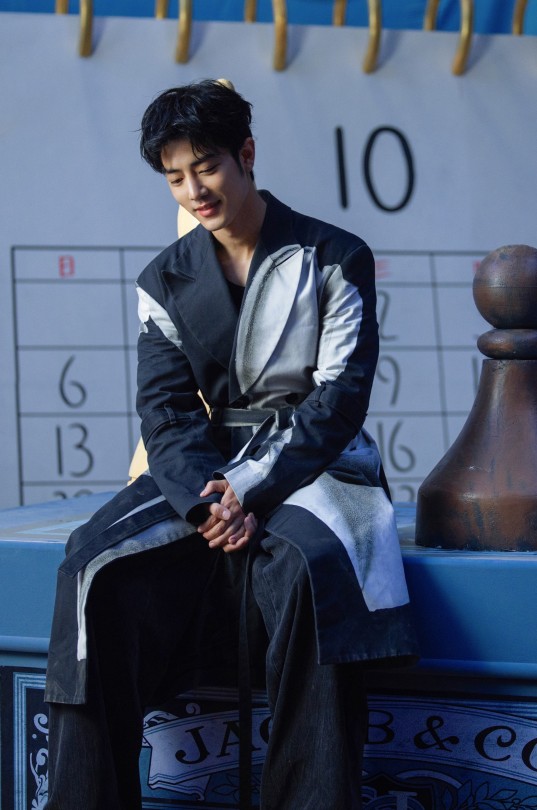
5. Lyricism
He's credited for partnering on lyrics for Wo Men, Piaoliu, and Buyao Huitou, and it's possible he worked on other songs to a lesser extent. Which makes sense: of course he would do his own lyrics for a passionate project like this.
(Translation credit to @izanyizhan, ty so much for your hard work!)
Wo Men: This is not the song I expected from him! It's complicated and dark. There is SO MUCH about this album where he defied our expectations.
Piaoliu: This is an extremely vulnerable song, wow. A brave song, going against expectations and against social niceties and standing up for what you really want. Xiao Zhan is a polite person and it's cool to get a song from him that's so bold.
Buyao Huitou: "I'll take my stubbornness and go towards the center of the light" - Enough said. The lyrics of this song are so determined and hopeful. And the vocals crescendo beautifully. It's my favorite song.* I love that he said it's written to himself.
*(Look, I have 3 favorites, 6 second-favorites, and 2 that I "only" love. This album is everything I ever wanted musically. Not lying, my 10 most-listened-to songs of 2024 were this album, even though it came out in Nov. 😅)
(And of course those of us with turtle minds got caught on, "As long as there's a single glance waiting for me to start the show." That hit me hard. The feeling of having my S.O. in the audience, when there's that one person I'm excited to perform for. Wow. I imagine when you're a superstar with millions of fans, this takes on even deeper meaning.)
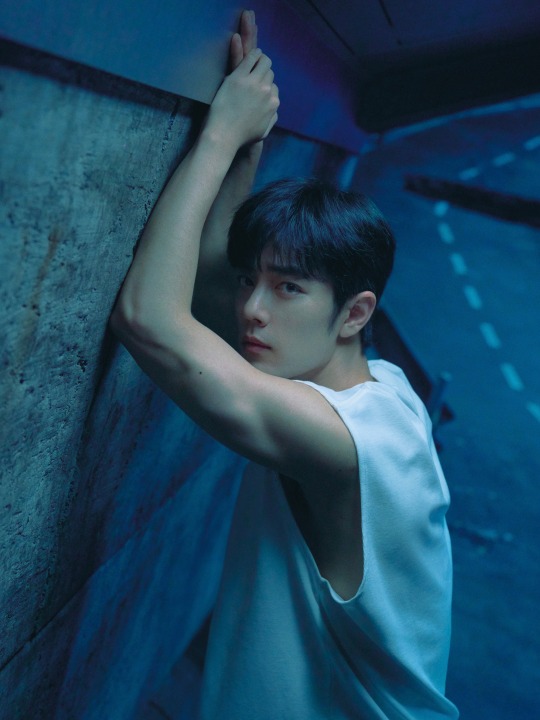
6. Live orchestra
You can tell the difference and it is yet another thing elevating the quality of this album. (I feel like I have a personal stake in this because one of my parents is a professional musician haha! But also, it really does make a difference.)
Next time I want to (lovingly) complain about waiting a long time for things, I will remind myself of this album, which is incredible precisely because he spent 3 years on it and worked with such high-quality people.
7. Vocal range
If I had to pick 2, Guiling and Buyao Huitou are my favorite songs, and it's because he effortlessly transitions across his range through chest voice, head voice, and falsetto.
I cannot express how much work over multiple years it took me to learn to do this, and you can get out of practice (although we know Xiao-laoshi is always singing on his sets!). Navigating those transitions is (in my not-professional opinion) one of the hardest skills for a vocalist; I'll back that up with the fact that plenty of professional vocalists (including Wang Yibo) struggle with it.
Another part of why it sounds so good is that Xiao Zhan knows how to make the weaknesses of his voice work for him. Not only can he use vocal break as an effect, he is also aware of where his voice breaks naturally and uses that.
Take Piaoliu, where he uses the edges of each register to actually put more emotion in.
There are many great singers out there, and there are singers with more training than him, but he showed he has a solid foundation in a wide range of techniques.
8. Storyline
I won't talk too much about this because I would just be reiterating what Zhanzhan wrote about each song for the release. But I appreciate that it tells a thematic story, and of course it's a story characteristic of him: (a) contemplating the human condition (b) on a hopeful trajectory.

I might also be interpreting this through my decade in western publishing for my day job. Storytelling looks different across times and cultures, but I noticed that the album follows the three-act structure typical of a lot of modern fiction -- he even released it like that. It could easily be coincidence, though.
(Western publishing likes to hold up things like three-act structure as "universals," but, like. With no actual evidence. 😂)
9. Composition
There are some things in this album which would be unusual for "run-of-the-mill mandopop," such as the heavy use of borrowed chords, the intro/outro, the discordant strings in Wan'an (which I have mixed feelings about personally lol!), etc. He didn't play it safe; at points, it feels almost avant-garde.
Considering this is his first album, I think more outside the norm is better, especially if he wants to be taken seriously as an artist. Meaningful art involves risk and breaking expectations! (Therefore, I forgive the purposeful discordance. 😂) ((I would anyway because we got 10 full songs of his voice!!!!))
There are a lot of good reasons that «Wo Men» is rating so highly. I'm not the only person who expected him to release something more commonplace. And then he released ART instead.
It feels similar to what Xiao Zhan and Wang Yibo have been doing to transition away from traffic stars to serious film actors. He's moved away from boy-group popstar to establish himself firmly as a serious singer.
10. Ta & Ta
I always notice when songs refer to someone's gender. It was very inclusive of Xiao-laoshi to refer to both very specifically like this. 🌈 My LGBT self really super appreciated that.
Ten songs, so ten bullet points for verisimilitude! It's just a random thing, but this line in Wan'an:
"You xiangqi ta (她) huoshi ta (他)"
(Reminded again of her, or of him)
晚安
I really love that the «Wo Men» Outro ends with some spatial tuning as the strings fade out, then the footsteps, and then his voice is panned left, like you're passing one another on the road. Like the album's theme of passing others on life's journey. And it makes me think of every time he's said he's just a normal person like everyone else.
Plus Xiao Zhan saying goodnight to us gives us emotions. What a way to end the album.
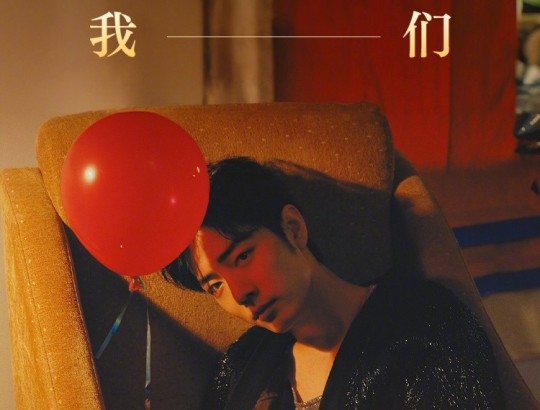
(All images from Official Weibo accounts of Xiao Zhan and XZS.)
#wo men#music#writing this made me realize there are a few vocal techniques i've been using for decades which I don't know the term for#i have a roommate who is a composer and i had to go to him like “what is it called when...” 😂#musicality#vocal technique#seriously though xiao-laoshi's voice is truly incredible#xiao zhan#yza#we/us#肖战#我们#long post#mine#wild
27 notes
·
View notes
Text
For those interested in a sing-along: here is an English translation of the encore song from the Link Click Musical. (you know, the one one with the hug.)
The tentative title, supplied by a weibo user, is 追光者 "Zhuīguāng zhě" <- Recent lyrics call this 《追光的人》
Edit: It didn't hold up lol. Big thank you @chocolatexiaoshi for teaching me! 追光的人 means People who Pursue Light/ Chase Light/ or Seek Light . Some lyrics have been and will continue to be modified as we work on this!
追光 translates to “spotlight” in my dictionary. Literally, it means "to chase light" In this song, 追光 is personified as either 追光者 or 追光的人. Pretty cool term to use in a stage play! Google translates this as “light chaser.” I’ve chosen to go with “guiding light.” We will see how poorly that holds up to official translation ^^;
Each line punches the gut harder that the last. This song basically references the s2 ending, then ties it into the earthquake ark. It's brilliant. It hurts. Listen to the video while you read. Please enjoy :)
Disclaimer: As always, I am a novice translating for fun, because I want to sing-along and know what I'm saying. I can’t speak or read this language. If you've checked google translate, this doesn't add much extra, but! this post conveniently includes Hanzi, Pinyin, and English for you to reference + a few notes. I've primarily used Pleco, inputting word by word, with mdgb.net/google for extra clarification. I'm learning, but fairly confident that this is reliable, though not fluent. Please reach out about any mistakes you find!
link to video
link to origin lyrics: one, two , and a thank you to @sgdlr-asdfghjkl for providing them!
---
-追光者-
LG:
城市一隅寂静角落
Chéngshì yīyú jìjìng jiǎoluò
A quiet nook in the corner of the city
破旧相馆串眹你我
Pòjiù xiàng guǎn chuàn zhèn nǐ wǒ
Our shabby photo studio ties us together
目睹命运莫测
Mùdǔ mìngyùn mò cè
Witnessing unpredictable fate
难逃重蹈覆辙
Nán táo chóngdǎofùzhé <- idom follow the track of the overturned cart.
It's hard to escape the same mistakes
照片窥探他的时空
Zhàopiàn kuīchēn tā de shíkōng
Peaking at his timeline in the photograph
无人知晓真实的我
Wú rén zhīxiǎo zhēnshí de wǒ
No one understands the real me
相遇还是重逢, 他不知, 我也不能说
Xiāngyù háishì lànghuā, Tā bùzhī, Wǒ yě bùnéng shuō
Whether this is our first encounter or our reunion, he doesn't know and I also cannot say.
-
CXS:
善于洒脱遮掩脆弱
Shànyú sǎtuō zhēyǎn cuìruò
I'm good at being at ease to hide weakness
他的出现如光降落
Tā de chūxiàn rú guāng jiàngluò
He emerges like light descending
学会渥手言和
Xuéhuì wò shǒu yán hé
Learning to shake hands and make peace
释怀亲情的枷锁
Shìhuái qīnqíng de jiāsuǒ
I'll let go of the chains of familial affection.
谁都有难圆的梦不止是我
Shéi dōu yǒu nán yuán de mèng bùzhǐ shì wǒ
Everyone has unfulfilled dreams, not just me.
-
LG:
遗憾指引着赶路的我
Yíhàn zhǐyǐnzhe gǎnlù de wǒ
Regret guides me in my pursuit
CXS:
回忆温暖着迷路的我
Huíyì wēn nuǎn zháo mílù de wǒ
Memories warm me when I’m lost
-
Both CXS/LG:
绕过岁月错落, 不问值不值得,
Ràoguò suìyuè cuòluò, bù wèn zhí bù zhídé
Detouring through time scattered around, don’t ask if it’s worth it or not
打破轮回的规则
Dǎpò lúnhuí de guīzé
Break through the rules of the the time loop
Refrain:
我一次又一次全力以赴, 跨越时间的沟壑
Wǒ yīcìyòuyīcì quánlìyǐfù, kuàyuè shíjiān de gōuhè
Again and again I’ll give my all, leaping across the ravine of time
无视黑夜白昼的界限, 试图换一个结果.
Wúshì hēiyè báizhòu de jièxiàn, shìtú huàn yī gè jiéguǒ
Ignore the boundary between night and day, and attempt to exchange one outcome
经历过, 才看破
Jīnglìguò, Cái kànpò
With experience, the ability to perceive
人生剧情总独特又重合
Rénshēng jùqíng zǒng dútè yòu chónghé,
The unique sums of life’s play will coincide again <- (arithmetic language. each timeline = a sum and you add timelines together to find a solution.)
却依旧不妥协不退缩, 让难题被弥合
Què yījiù bù tuǒxié bù tuìsuō ràng nántí bèi míhé
But still, don't compromise, don't cower and the problem twill be solved
-
每一次击掌后踏上旅途重返分岔的路口
Měi yīcì jí zhǎng hòu tà shàng lǚtú chóng fǎn fēn chà de lùkǒu
Every high five sets us back on the journey, we return to the branching crossroads
逆转時空的代价需要感性和理性拉扯
Nìzhuǎn shíkōng de dàijià xūyào gǎnxìng hé lǐxìng lāchě
The price of reversing time requires perception and reason's pull
追光者, 平凡者
Zhuī guāng zhě, píngfán zhě
People pursuing light, Ordinary people
不能插手为何感同身受
Bùnéng chāshǒu wéihé gǎntóngshēnshòu <- idiom: "to feel indebted as if the favor were received in person", meaning: "to feel as if it happened to oneself."
If you can’t lend a hand, why do you sympathize
任往事一幕幕 重演着
Rèn wǎngshì yīmù mù chóngyǎnzhe
Allow past events to play out, reenactor
却只能铭记职责
Què zhǐ néng míngjì zhízé
But we must bear responsibility
-
Chen Xiao and his Mom:
追光的人穿梭不同时空撕开时间的裂缝
Zhuīguāng de rén chuānsuō bùtóng shíkōng sī kāi shíjiān de lièfèng
The people who pursue light go back and forth between different times and space, ripping open cracks in time
尘埃落定的回忆激活过去与现实交错
Chén'āiluòdìng de huíyì jīhuó guòqù yǔ xiànshí jiāocuò
The memory’s dust has settled, causing the past to intertwine with present <-(激活- lit. chemical activation)
翻越着, 感受过
Fānyuè zhe, gǎnshòu guò
To climb over, to experience
不能重来的也还有更多
Bùnéng chóng lái de yěxǔ hái yǒu gèngduō
There are probably many things we cannot do over
却偏要去折叠去缝合让心结被愈合
Què piān yào qù zhédié qù fénghé ràng xīn jié bèi yùhe
But I must go fold, go suture, so this knot in my heart can heal
——
All:
追光的人圆满他们的梦抚平自己的伤口
Zhuīguāng de rén yuánmǎn tāmen de mèng fǔ píng zìjǐ de shāngkǒu
People who pursue light will satisfy their dreams and smooth their own wounds
逆转时针的能力操控宿命与现实相逢
Nìzhuǎn shízhēn de nénglì cāokòng sùmìng yǔ xiànshí xiāngféng
The ability to reverse the hands of the clock manipulates fate to meet reality.
追光者, 旁观者
Zhuīguāng zhě, pángguān zhě
People pursuing light, A bystander
轨迹从不许人失而复得
Guǐjī cóng bùxǔ rén shī'érfùdé
The trajectory will never allow a person to lose and regain
决不能任遗憾摆弄着, 让悔恨成为执着
Jué bùnéng rèn yíhàn bǎinòngzhe, ràng huǐhèn chéngwéi zhízhuó
Never can regrets be fiddled with, remorse will become attachment
-
LG:
追光者守护你救赎我
Zhuīguāng zhě shǒuhù nǐ jiùshú wǒ
People pursuing light will defend you and redeem me
让遗憾告别生活
Ràng yíhàn gàobié shēnghuó
To make regret depart from life
148 notes
·
View notes
Text
Thinking about all the mxtx fics that gave effy names to their ocs/bg characters or straight up named them something that could not exist in Chinese pinyin again...

Just so you know these are the basic pinyin combinations that exist.
That's not even going into dialects which is a whole other thing but as far as I've seen no one has tried to write LWJ speaking in gusu dialect yet which is the irl suzhou dialec
And please be careful what you name your characters, I've seen someone name their characters Blue Book, Blue Radish, Blue Smell, Blue Bag, Scenery
Also be careful with naming them after flowers because they might end up sounding like prostitute names
The thing is WWX's birth name is literally the character for baby so weird literal names can and do exist
Hell my aunt's Chinese name is literally 'rainbow', my yeye's name was 'genius' and my nainai's sworn sister (idk how to describe it they were basically such good friends they basically call each other sisters alongside like two other women and their and my family have reunion dinner once in a while) her name was literally High Cloud 高云
Even in svssss (not counting six balls) LBH's name is literally 'the icy Luo river'
But even then they at least have nice meanings even if they ate very literal, and not like objects (tho ngl 蓝香 lan xiang, is very pretty but the author intended it to be mean spice xiangliao香料 but xiang by itself really just means smells/fragrance)
Just, please please note that Chinese words meanings changes when paired with other words and lose that meaning when it's by itself.
Like 包 bao by itself means bag. 包子 baozi means dumpling. You cannot take out the zi子 away from baozi and keep the meaning of dumpling.
But the thing is, they were all not educated. I feel like educated ppl or people with money to go to a fortune teller get nice poetic names if not then the child gets a very literal name. Though I guess birth names could get away with being more literal. LooKING AT YOU CCSR AND WCZ YOU LITERALLY NAMED YOUR CHILD WEI BABY
#Text post#Mxtx#Mdzs#mo dao zu shi#Research hard but...#I stg if I find another character with a Japanese-ish name in danmei fic...#Idk I'm feeling ranty these days#Language#wei wuxian#can you imagine naming your baby 'baby'?#i got my chinese name from a temple fortune teller#apparently i eas supposed to change it once i hit 12
81 notes
·
View notes